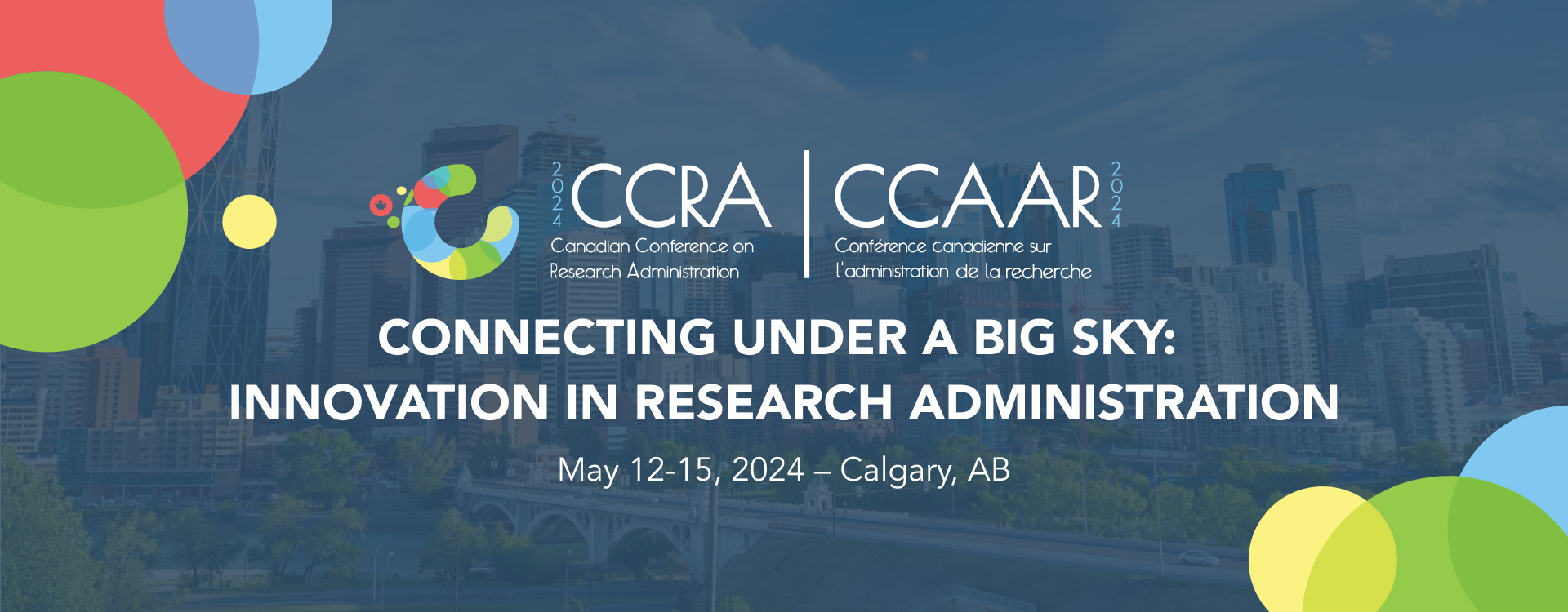

 May 12, 2024 08:00 am
May 12, 2024 08:00 am May 12, 2024 08:45 am
May 12, 2024 08:45 am Michael Walesiak
University of Alberta

Snjezana Cekrlija
University of Waterloo
Darlene Dakin
Asifali Momin
Imperial 5-7
The purpose of the Research Finance workshop is to promote networking, knowledge sharing and identify best practices using case studies covering a range of research finance topics. The workshop is for those involved in the financial administration of research awards but also of potential interest to non-financial research administrators who may want to gain a broader understanding of current research finance issues. Whether you are someone with less than a year in Research Finance, or someone who has a number of years of experience, this workshop, following a case study format and roundtable discussions, will be engaging and informative. Potential topics of discussion may include management of Mitacs awards, Tri-agency expense eligibility and TAGFA, research funding in foreign currencies, closure of research projects, residual balances and NSERC&SSHRC General Research Fund. The case study and roundtable discussions format will allow you to engage with peers as you discuss the facts of each case, identify potential solutions and hear others draw on their experiences whilst getting your questions answered and learning about how other institutions manage various scenarios.
 May 12, 2024 08:45 am
May 12, 2024 08:45 am Krista Stelkia
Laura McNab-Coombs
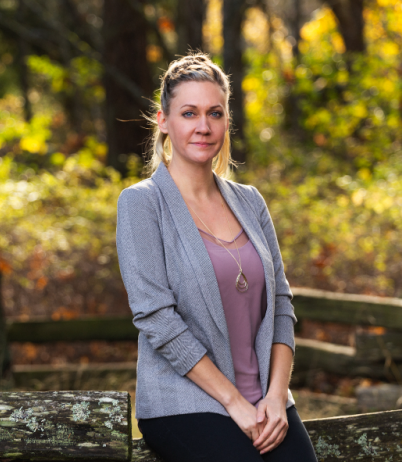
Tara Erb
BC NEIHR/University of Victoria
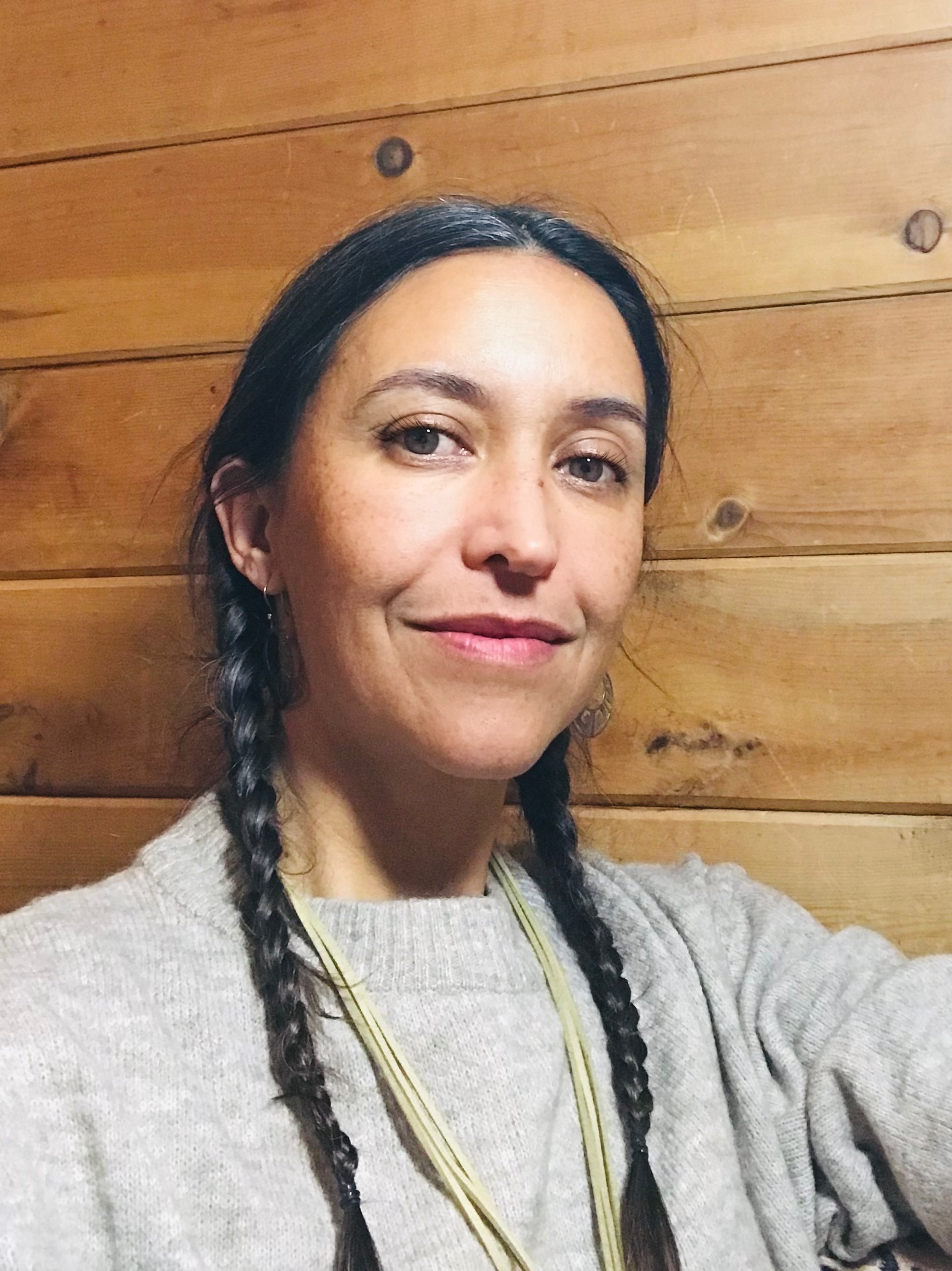
Jimena Garcia Paniagua
Doll/Herald 72
This workshop explores EDI principles, emphasizing the need for an Indigenous-specific inclusivity framework called Indigenous Cultural Safety (ICS), which provides guidelines and principles that explicitly address colonial historical injustices inflicted on Indigenous peoples. BC NEIHR’s presentation will focus on the implementation of ICS in research administration environments. The workshop will provide participants with the opportunity to engage in a co-creative process that will result in practical and straightforward ICS implementation strategies. We will also discuss inclusive and ethical practices when working in partnership with Indigenous communities. Workshop description: We will start with a comprehensive presentation of what ICS is, the available frameworks to work with, and how it bridges to some EDI principles. To ensure the comprehension of the topic, we will invite our audience to reflect and use hands-on activities for the implementation of ICS frameworks in research administration. (45 minutes) Activities: 1) Creating a research administration map / diagram. The purpose of this activity is to present a generic research administration system map, including processes, positions, roles, assets, and gaps. Following this, participants will create their own organization’s map. The outcome will be an imperfect map that will draw the areas that clearly differentiate in which aspects ICS or EDI must be implemented. (30 minutes) 2) The participants will then share their maps and talk about one challenge, one gap, and one asset they face regarding ICS in their administration process during a world cafe activity. After everyone has shared their maps, the group will provide feedback and discuss ideas and proposals on how to implement ICS principles (30 minutes) 3) We will then engage in a collective intelligence process to co-create generic ICS implementation strategies that can serve a variety of research administration processes. The question guiding this activity will be: How can ICS be implemented through the diverse aspects of research administration? We will consider the following topics: funding streams, grant proposals, including Indigenous partners; contracting and integrating Indigenous peoples; credentials versus cultural training; organizing equitable, safe and inclusive teams; relational contracts and MOUs; payment vs reciprocity; data management, storage, and copyrights; culturally safe and inclusive knowledge sharing; and other forms of knowledge mobilization in a respectful relationship with Indigenous people. (60 minutes)
 May 12, 2024 08:45 am
May 12, 2024 08:45 am
Leslie Cove
University of Waterloo

Sara Anderson
Senior Manager, Indigenous Research at the University of Waterloo
Stephen AB 54 Classroom
Research administration and programming across campuses often talk of co-creation but what does this mean? And, how do we practice it in our day to day roles? What roles do Senior Leaders have in supporting and ensuring co-created approaches? How does co-creation fit in with research? In this interactive workshop, we will take an EDI lens on co-creation but then go beyond to understand it as a daily practice in our work.
 May 12, 2024 08:45 am
May 12, 2024 08:45 am Dominique Michaud
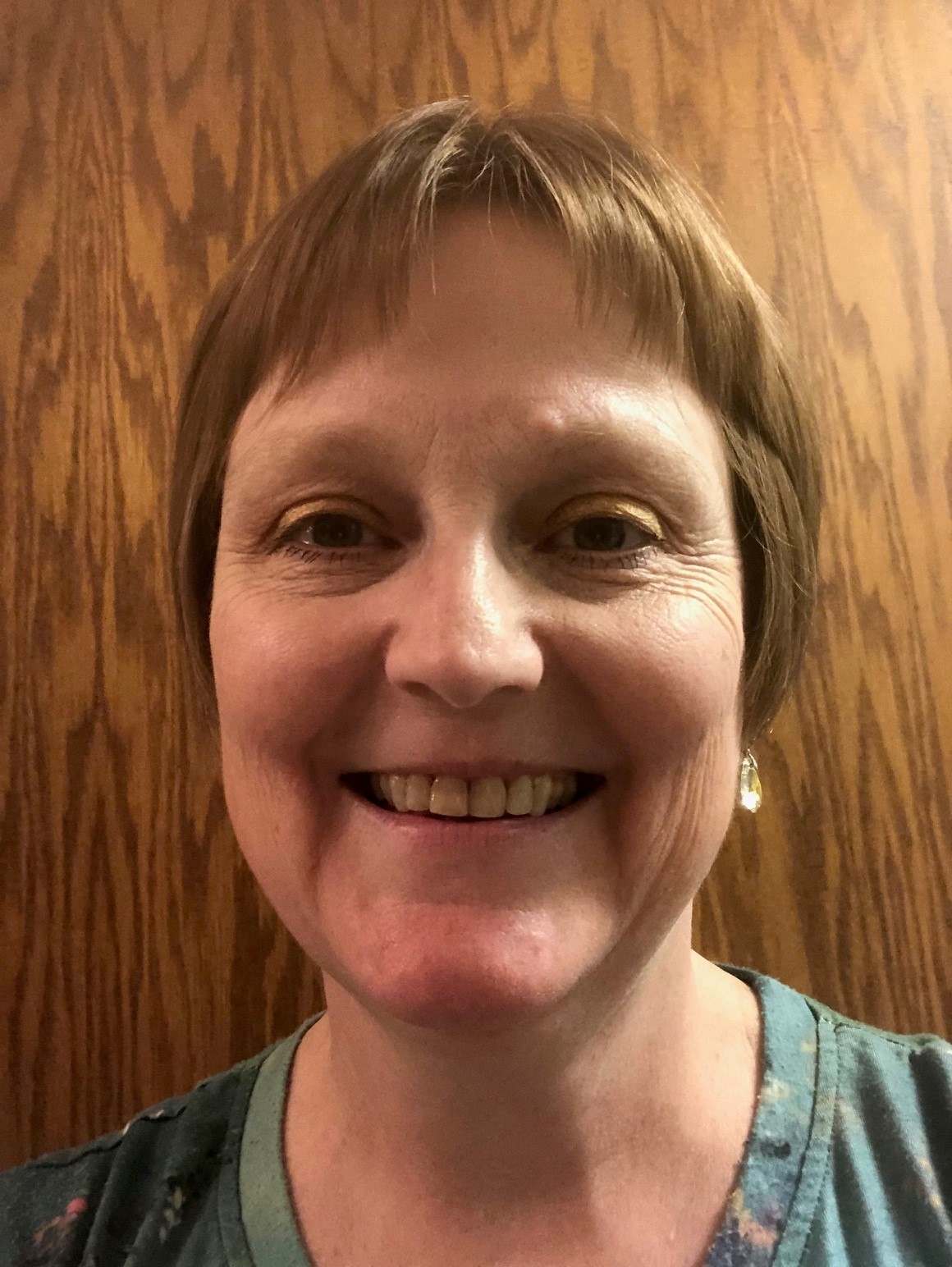
Karen Mosier
University of Saskatchewan
Walker/Bannerman
This workshop recaps and builds on a webinar series first offered in Fall 2023. Sound, effective planning lies at the core of successful research events. This workshop will cover the essentials that need to be considered at each stage of a research event. Group discussions will be facilitated throughout the workshop and several concrete examples of planning aids and templates will be offered to help participants visualize the timeline and execution of a research event.
 May 12, 2024 12:00 pm
May 12, 2024 12:00 pm May 12, 2024 01:30 pm
May 12, 2024 01:30 pm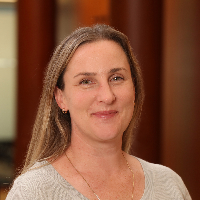
Mika Johnson
Queen's University

Kevin Hamilton
Director, Institutional Initiatives, University of Toronto

Stacey Leavitt
Research Grant Development Coordinator, Athabasca University
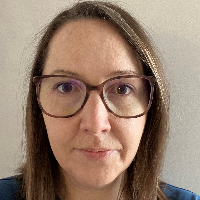
Mayron Moorhead
Associate Director, Institutional Programs, Queen’s University
Imperial 5-7
This session will be an opportunity for administrators of the Canada Research Chairs (CRC) Program at a variety of Canadian institutions to come together to discuss effective means of allocating, recruiting, and supporting chairholders, while integrating best practices related to EDI into their practices and meeting institutional equity targets. Noting that institutional size and chair allocation will differentiate needs and standard operating procedures, a practitioner’s group will be established to allow continued sharing of programmatic expertise and discussion of best practices.
 May 12, 2024 01:30 pm
May 12, 2024 01:30 pm
Keeta Gladue
University of Calgary
Doll/Herald 72
Objective: The purpose of this workshop is to provide participants with a deeper understanding of Indigenous research, focusing on the ethical considerations, historical context, and contemporary practices involved in conducting research with Indigenous Peoples. Participants will gain insights into the intricacies of Indigenous research, emphasizing the importance of building respectful relationships and engaging with Indigenous communities. Target Audience: This workshop is designed for research administrators, academics, students, and professionals who are interested in or involved with Indigenous research, community engagement, and ethical considerations in research practices. Workshop Overview: 1. Introduction to Indigenous Research: • Brief overview of the historical context of unethical Indigenous research in North America that serves as the foundation for TCPS 2 Chapter 9. 2. Tri-council Criteria for Indigenous Research: • In-depth discussion on the Tri-council criteria for Indigenous research to ensure participants feel confident in navigating and adhering to these guidelines of what is considered Indigenous research. 3. Community Engagement in Indigenous Research: • Examination of the principles and practices of community engagement from an Indigenous research perspective. • Mock ethics application and case studies provided for discussion. 4. Indigenous Data Sovereignty: • Introduction to Indigenous data governance frameworks, with a focus on OCAP (Ownership, Control, Access, and Possession) and the CARE principles (Collective benefit, Authority to control, Responsibility, and Ethics). • Understanding the significance of respecting Indigenous data sovereignty in research projects. • Workshop Format: The workshop will employ a combination of presentation, quizzes, group discussions, case studies, and interactive activities to facilitate engagement and knowledge retention. Outcomes: By the end of the workshop, participants will: • Build a better understanding of the complex history of Indigenous research in a North American. • Feel confident in their understanding of the Tri-council criteria for Indigenous research. • Develop a deeper understanding of meaningful community engagement which occurs throughout the research lifecycle. • Identify and understand Indigenous data frameworks such as OCAP or the CARE principles. Conclusion: This workshop aims to empower participants with the knowledge and skills necessary to support ethical and respectful Indigenous research. By fostering a deeper understanding of the historical context and contemporary practices, participants will be better equipped to engage with Indigenous communities and contribute meaningfully to the field of Indigenous research.
 May 12, 2024 01:30 pm
May 12, 2024 01:30 pm
Robyn Roscoe
Lyric Management
Walker/Bannerman 72
Effective research administration involves several core relational skills. NB this could be delivered as three 45-minute break-out sessions if that fits better for scheduling. In this workshop, we will look at: • Effective communication – essentials and best practices, including establishing key messages, mindful listening, persuasion, and assertiveness. • Stakeholder collaboration – defining stakeholders and their requirements to build effective collaborations. • Prioritization and time management - applying a goal-setting approach to tasks, classifying work within the urgent-vs-important matrix, and look at some effective tools for managing your time to increase effectiveness and productivity and (more importantly) to reduce stress and improve contribution. Outline: • 35 min presentation with ongoing participant dialogue • 10 min Q&A
 May 12, 2024 01:30 pm
May 12, 2024 01:30 pm
Kyle Demes
OurResearch
Stephen AB 54 Classroom
OpenAlex is a comprehensive, free, and completely open database of the global research ecosystem (outputs, authors, institutions, etc.). In this session, we will (1) explore the foundations of OpenAlex as a source for research intelligence (2) showcase use cases by institutions around the world (3) walk through how to perform common research intelligence use cases in OpenAlex, and (4) have a guided, hands-on workshop where participants can use OpenAlex for their own research intelligence use cases. Participants are encouraged (but not required) to bring laptops and follow along—because OpenAlex is completely open, no licenses or additional software are required.
 May 12, 2024 05:00 pm
May 12, 2024 05:00 pmConference Floor Level 3
 May 13, 2024 07:00 am
May 13, 2024 07:00 amConference Floor Level 3
 May 13, 2024 07:30 am
May 13, 2024 07:30 amConference Floor Level 3
 May 13, 2024 08:30 am
May 13, 2024 08:30 am
Erin O'Toole
University of Calgary

Malinda Smith
University of Calgary
Imperial 1-6
Achieving research excellence in the 21st century demands a steadfast commitment to Equity, Diversity, and Inclusion (EDI). While EDI-centered approaches are on the rise among funders and institutions, administrative and systemic barriers persist, and impede progress. This keynote session will explore these, and other current topics in EDI in the research ecosystem. The Keynote speaker is Dr. Malinda Smith, the inaugural Vice Provost and Associate Vice President Research (Equity, Diversity, and Inclusion) and a Professor of Political Science at the University of Calgary. She is the coauthor, editor, or coeditor of 8 books, numerous articles, book chapters and reports and has given dozens of keynotes and public lectures in the areas of equity, diversity, human rights, and decolonization in higher education, African political economy, and international relations.
Dr. Smith will share her perspectives on EDI in the Canadian research ecosystem, drawing on lessons learned as a participating institution in the the NSERC Dimensions Pilot Program (which resulted in a “Dimensions: Construction”), and subsequent institutional EDI initiatives, including UCalgary’s Presidential Task Force on Equity, Diversity, Inclusion, and Accessibility (PTF-EDIA), co-chaired by Dr. Smith.
 May 13, 2024 09:30 am
May 13, 2024 09:30 am Matthew Lucas
Andrew Wakefield
Imperial 1-6
The three federal research granting agencies (the “Tri-Agencies), the Canadian Institutes of Health Research (CIHR), Natural Sciences and Engineering Research Council (NSERC) and Social Sciences and Humanities Research Council (SSHRC), will provide an overview of any changes to the federal research funding landscape including information on new programs or policies that are relevant to all three agencies and their respective communities. The purpose of this session is to provide a more general overview, while the agency sessions (NSERC, SSHRC and TIPS updates) will provide the opportunity for more agency-specific detail.
 May 13, 2024 10:45 am
May 13, 2024 10:45 am
Julie Caldwell
Accessibility Institute, Carleton University
Imperial 9 40 Rounds
In 2018, the Accessibility Institute (formerly READ Initiative) at Carleton University moved from being a side-of-desk initiative to becoming an established stand-alone unit on campus, reporting directly to both the Vice-President, Students and Enrollment as well as the Vice-President, Research & International. Having been awarded over $15 million in funding since being established, the Institute has become well-known for its collaborations and applied research initiatives with a lens of creating a more accessible Canada. There’s just one catch, this recently established department is not formally considered a research unit in the traditional sense, and as such, has been working with campus partners in Research Finance, Industry and Partnership Services, Human Resources, Procurement Services, as well as others, to navigate the challenges of applying for and being awarded externally funded grants that are required to go through the typical research administration processes, but don’t function in the traditional way. In this session, participants will hear how the Accessibility Institute team has navigated these crucial conversations and collaborated with campus partners to adapt and revise institutional systems and processes to create a (relatively) seamless experience in delivering project-based accessibility research.
 May 13, 2024 10:45 am
May 13, 2024 10:45 am Carolyn Mullin
Niagara College
Lauren Gogo
Hamilton Health Sciences Corporation
Taylor van Veen
University of Toronto
Doll/Herald 72
We often hear discussions about how to negotiate a contracts with an industry sponsor- but what about working with a fellow academic institution? This panel will hear from contracts experts, each with a different background: hospital, university and college. If we are negotiating with each other, why might one organization ask for a specific clause? What can we not agree to? Let's discuss how we can work together better!
 May 13, 2024 10:45 am
May 13, 2024 10:45 am
Malinda Smith
University of Calgary

Miwa Aoki Takeuchi
University Of Calgary

Nicole Kaniki
Senomi Solutions

Erin O'Toole
University of Calgary
Imperial 1-6
In recent years, Canadian research funding agencies have embarked on initiatives to cultivate a more equitable, diverse, and inclusive research ecosystem. Recognizing the imperative to dismantle systemic barriers hindering the full participation of talented individuals, the Tri-Council funding agencies have prioritized fostering research cultures where considerations of equity, diversity, and inclusion (EDI) are seamlessly integrated into every facet of the research process. This commitment has manifested in the introduction of new institutional EDI requirements across key Tri-Council funding programs. This panel discussion will provide a variety of perspectives on effective EDI planning to meet these requirements, and insight on how institutions can move beyond a “requirements-based” approach in crafting and implementing EDIA action plans.
 May 13, 2024 10:45 am
May 13, 2024 10:45 am
Stephanie Fisher
University of Toronto
Imperial 5-7
Having access to successful grant applications significantly helps applicants in developing their own proposals. Researchers who are inexperienced in applying to research funding or are new to the Canadian funding landscape stand to benefit greatly from this kind of peer-to-peer support, but they don’t always have the professional networks in place to get their hands on a successful grant application. One way that institutions are meeting this need and help facilitate the sharing of grant applications between their researchers is by collecting and distributing successful grant applications themselves, often through the creation of a repository. The “Grants Library” at the Faculty of Arts & Science at the University of Toronto has proven to be an invaluable resource in assisting researchers in proposal development, however there are real challenges in building and maintaining such this resource, including (but not limited to) determining priorities, evaluation criteria, maintenance and navigating researchers’ concerns related to security, confidentiality, and privacy. This session will provide an overview of “how to” create a repository of exemplary grant applications from start to finish, with a focus on sharing the unforeseen challenges that we encountered and experienced over a three-year period (from initial development through to the maintenance phase). The presentation will cover the goals, priorities, principles, and policies that guide the development and govern the use of the repository, the development timeline for the project, the different tools used, the process for identifying and inviting potential contributors, staffing and expertise requirements, and considerations related to permissions, privacy, and access. This presentation will be of interest to research administrators who are interested in creating resources for proposal development and building similar repositories.
 May 13, 2024 10:45 am
May 13, 2024 10:45 am
Laura Bredahl
University of Waterloo

Mary Ochana
University of Waterloo
Walker/Bannerman 72
It’s time you started wondering about researcher identifiers! With the implementation of open access and research data management policies in Canada, we’re quickly learning that data integrity and consistency can get pretty messy. Persistent identifiers such as the Open Researcher and Contributor ID (ORCID) are an important part of ensuring consistent data workflows and can help with reliably matching authors to their institutions and their research outputs across systems. But many institutions are just starting to utilize ORCID because its utility is largely a mystery them. In this presentation we will demystify ORCID and persistent identifiers and discuss the benefits and challenges of implementing ORCID within a university. ORCID has the potential to help with automation and streamlining workflows using research information, increase data consistency and quality, and ultimately save time for research administration. Working with ORCID is a huge opportunity for research offices and libraries to collaborate and gain benefits for the whole institution. It’s time to learn about ORCID.
 May 13, 2024 11:45 am
May 13, 2024 11:45 am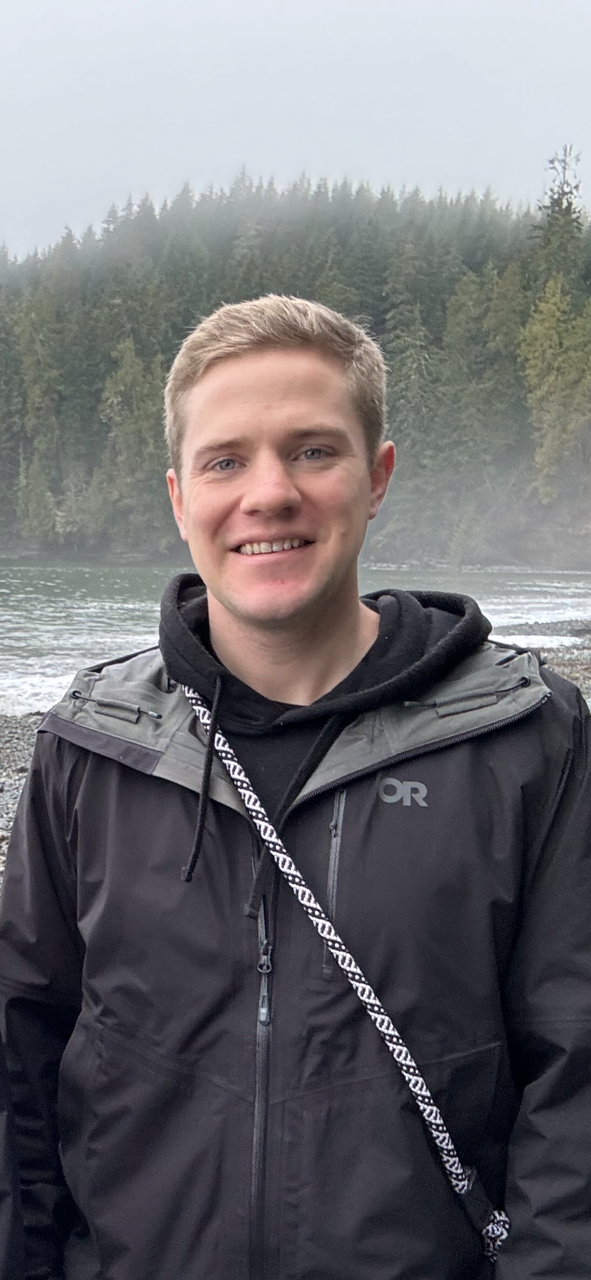
Aaron Brewer
University of Victoria
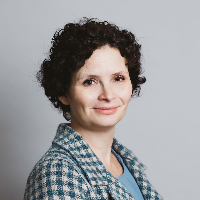
Melissa Joyce
University of Victoria
Regina Tiba
University of Victoria
Imperial 5-7
This session will discuss building relationships with researchers and how to provide the information on their research accounts and training. It will also look at Year End Reporting, researchers paying themselves from non tri-agency accounts and determining if the account is specific purpose or a research account and how to determine if it is a donation
 May 13, 2024 11:45 am
May 13, 2024 11:45 am
Christina Deroche
Canadore College
Carly Renaud
Stephen AB 108 Theatre
Responding to the needs identified by Indigenous communities and Industry partners, the First Peoples’ Centre at Canadore College launched the Transforming Indigenous Peoples Inquiry (TIPI): A Learning & Training Indigenous Research Hub. This Hub animates the spirit of gathering and sharing knowledge in a good way – and offers tools needed to support researchers work with Indigenous peoples. Informed by Indigenous research methodologies and frameworks, the Hub focuses on four main areas: governance, oversight, administration, and cultural safety. Canadore College also launched its Research Centre at the onset of the pandemic and the Centre has worked hard to support all its research hubs and become more trained and attuned to the needs of our Indigenous communities and partners, while focusing on aspects of research administration and project management. This session will provide an overview of Canadore College's TIPI Framework and will explore the importance of developing responsive research practices jointly between the Research Centre and FPC. Current approaches to Indigenous research and the steps each department is making to creating a wholistic approach research within the institution will be discussed as well as challenges presented along the way.
 May 13, 2024 11:45 am
May 13, 2024 11:45 am
Marlon Rajakaruna
Kingsgate Legal
Doll/Herald 72
Research contract negotiations are often long, time-consuming and costly. As a result, many research sites simply chose to ignore the boilerplate clauses such as governing law, venue, assignment, survival, force majeure, and others. This can unnecessarily expose your research site to serious financial risk. This presentation will help identify and describe the key boilerplate clauses in research contracts and will then provide the attendees with suggestions of how to negotiate these clauses in a proper and efficient manner.
 May 13, 2024 11:45 am
May 13, 2024 11:45 am
Laura Bredahl
University of Waterloo
Ian Milligan
University of Waterloo

Erica Conte
Unity Health Toronto
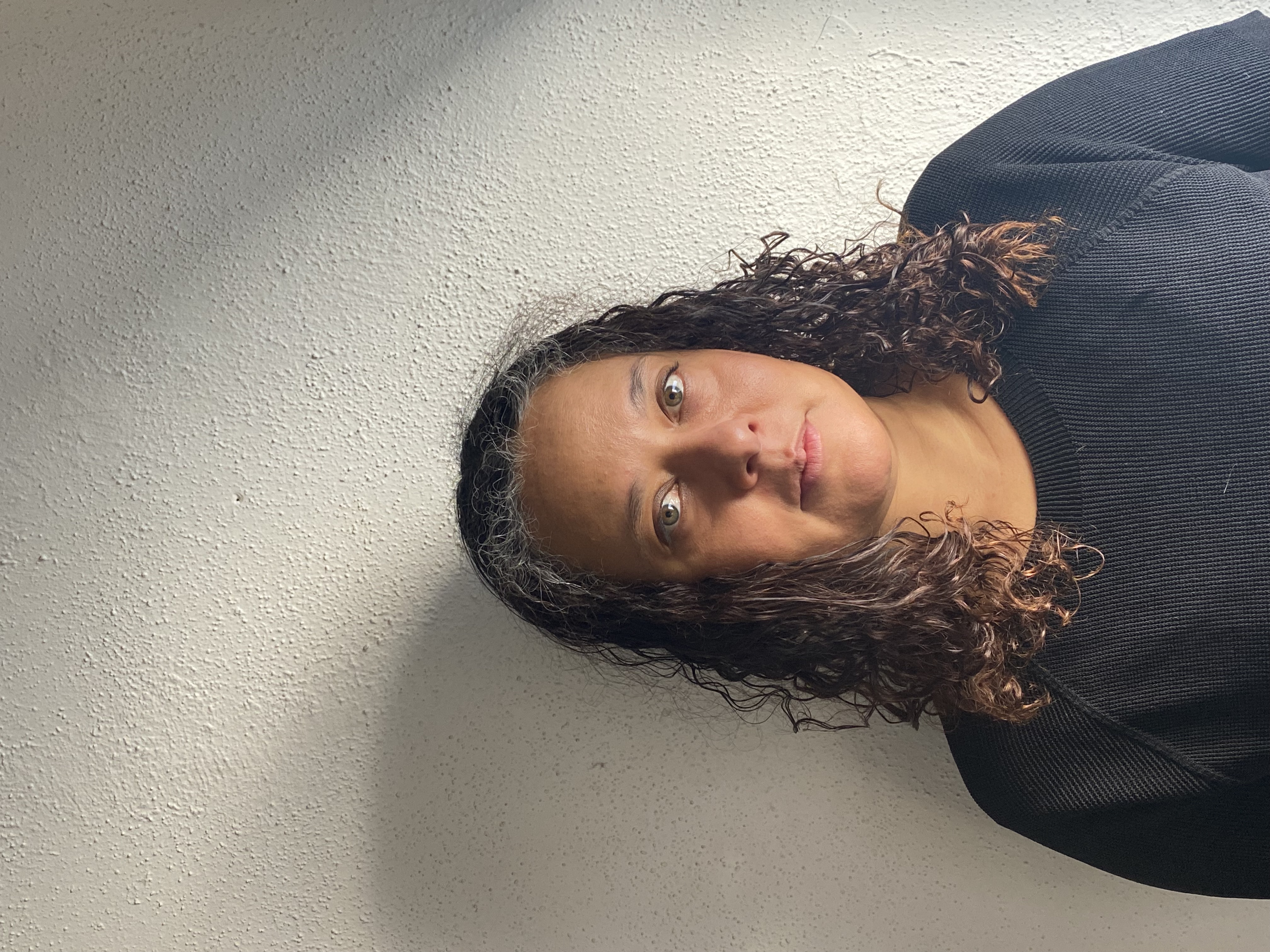
Thane Chambers
University of Alberta
Walker/Bannerman 72
University administrators love the numbers. The idea of having data to measure, compare, support decision making, and to understand initiatives and invested resources is something we strive for. The idea of using bibliometric data to assess research and benchmark institutional success/lack of success has been a long-standing modus operandi in academic institutions. However, when this type of analysis is done, it often feels like it’s missing something. The data doesn’t always appear to accurately reflect what we know is happening at our institutions, and the impacts that are observed both in our communities and across research disciplines. In this interactive session, we will explore how responsible ways of measuring research, that include quantitative and qualitative assessments and choosing the right indicators, can provide more meaningful data. Through this and thoughtful reflection on the challenges of measuring impacts at large institutions we can more fully reveal the stories of the research being done at our institutions. The session organizers include librarians and research offices, representing the collaborative approach we believe is necessary for institutions to meet these challenges. We will discuss initiatives at Canadian institutions that advocate for the responsible use of research impact metrics. And with the audience, we will explore ways in which these types of assessments can be used at other institutions to change what and how things are measured around research so that more accurate, more holistic, and more meaningful data can be gathered.
 May 13, 2024 11:45 am
May 13, 2024 11:45 am Patrick Pilot
Fondation canadienne pour l'innovation
Julia Bernard
Programs Officer
Natalee Rubec
Senior Programs Officer
Imperial 1-6
The CFI would share upcoming activities and discuss hot topics with respect to its activities. We are likely to touch on the 2025 competition of the Innovation Fund and on how research security is applied to CFI proposals and awards. A usual, we will encourage a discussion with the audience rather than an information offload.
 May 13, 2024 11:45 am
May 13, 2024 11:45 am
Gen Clark
University of Saskatchewan

Ann-Marie Field

Brandi Povitz
University of Calgary
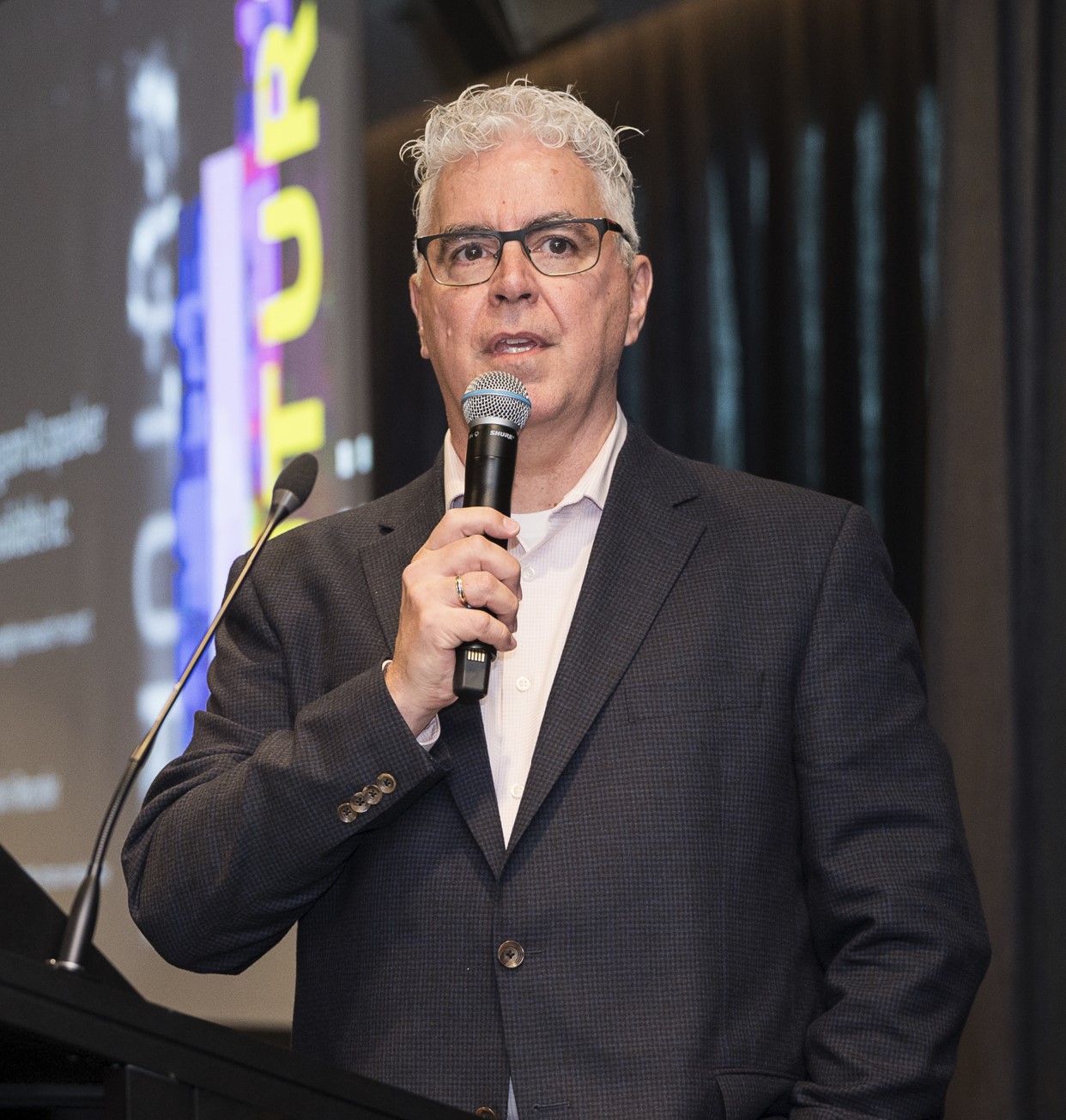
David Phipps

Anita Sharma
Thompson Rivers University
Imperial 9 40 Rounds
Central to fostering innovation in our profession is the act of publishing. Creating this permanent record of our collective knowledge gives credibility to our profession and helps spread and spark new ideas. Join this panel discussion with CARA members experienced in writing peer-reviewed articles, op-eds, and books. This session is ideal for anyone with a desire to share their professional insights more widely. Gain practical perspectives into the writing and publishing process, exploring its challenges and rewards through the experiences of research administrators turned authors. Come share your own experiences, too! This session is moderated by the co-chairs of the Grant Facilitators’ Journal Club.
 May 13, 2024 12:30 pm
May 13, 2024 12:30 pmConference Floor Level 3
 May 13, 2024 01:30 pm
May 13, 2024 01:30 pm
Tara Erb
BC NEIHR/University of Victoria
William Johnson

Fleur Macqueen Smith
Saskatchewan NEIHR
Kimberly Fairman
Leila Qashu
Stephen AB 108 Theatre
In Canada, the health research funding landscape continues to limit the self-determination of Indigenous Peoples in multiple ways, including institutional eligibility, priority setting, and institutional structures that deprioritize Indigenous knowledges. However, Indigenous-led research networks represent a promising approach to transforming the funding landscape to better support the self-determination of Indigenous peoples in health research. The Network Environments for Indigenous Health Research (NEIHR) program has nine Indigenous-led networks across Canada that support research leadership and self-determination among Indigenous communities. Funded by the Canadian Institute Health Research (CIHR), this $100.8M investment over 16 years represents the largest amount of funding the Canadian federal government has committed to Indigenous health research. In this session, seven of the provincial/territorial NEIHR centres, including the Atlantic, British Columbia, Northwest Territories, Alberta, Saskatchewan, Ontario, and Quebec, share the Indigenous values and principles that we uphold and how each centre operationalizes those values and principles within the context of their own region. A crucial component of operationalizing the NEIHR objectives, values and principles is the decolonization of the research administration process. From April 2020 to March 2023, the NEIHRs created annual evaluation reports. We conducted a critical analysis of our annual evaluation reports and data, which included assessing successes, challenges, and lessons learned on how through the decolonization of research administration we can better support the self-determination of Indigenous communities and impact their health research journey in Canada. Through narrative and reflection, we focus on the importance of addressing institutional readiness around research administration when working within community and how systems change is necessary to continue to support community-led health research.
 May 13, 2024 01:30 pm
May 13, 2024 01:30 pm
Robyn Roscoe
Lyric Management

Leslie Cove
University of Waterloo
Imperial 9 40 Rounds
A brief overview of the Research Management and Coordination Certificate program at Mohawk College from instructors, followed by panel of current and past students. Topics will include the opportunities and challenges of the program and courses, how the learning and the certificate contribute to personal, professional, and career development, and tips-and-tricks for successfully completing the program. Outline: • 10 mins intro by instructors (5 min each) • 20 min panel – 4-5 students • 15 min Q&A
 May 13, 2024 01:30 pm
May 13, 2024 01:30 pm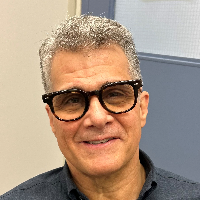
Drew Gyorke
Univesrity of Toronto
Mohit Jain
University of Calgary
Doll/Herald 72
Canadian researchers have recently gained access to submit applications and receive funds directly from the European Commission’s Horizon Europe - Pillar II Funding programs as a result of Canada achieving associate country participant status. This important development eliminates the limitations faced by Canadian researchers as non-associated country participants in the past. At the University of Calgary’s (UofC) Cumming School of Medicine (CSM) and the University of Toronto’s (UofT) Research Services Office, we are actively embracing this breakthrough. Drew Gyorke (Director, Agency & Foundation Funding, UofT) and Mohit Jain (Research Grants Development Officer, CSM, UofC) have been actively engaging and collaborating in the CARA Horizon Europe community of practice. This community comprises of grants administrators from various Canadian institutions and is dedicated to supporting Horizon Europe applications. These meetings serve as a dynamic forum where members collectively explore new developments in the EU framework. In this presentation, we will address the methods that we have used so far to learn about, promote, and support Horizon Europe applications at our institutions. In addition, we also aim to facilitate an interactive discussion with the audience to learn about tools and strategies that they have used within their own institutions.
 May 13, 2024 01:30 pm
May 13, 2024 01:30 pm Michael Lam
NSERC
Walker/Bannerman 72
Generative AI can help generate novel research ideas based on existing literature. For example, it can scan many scientific papers and propose potential research gaps or areas that have not been previously explored. It can also be used to draft and structure research proposals by providing literature reviews, defining research questions, suggesting methodologies, and predicting possible outcomes. Research proposals for grant applications require clear, precise, and persuasive language, and AI models can refine text to these ends to increase chances of funding. Given these powerful capabilities, consideration of the risks associated with the use of this technology should be given by research funders on the ethics on the reliance of these tools, concerns on intellectual ownership and confidentiality, and the quality and quantity of generated research proposals. This discussion will provide context on the guidance from the funding Councils to date and engage with the CARA community on the use of generative AI for these purposes.
 May 13, 2024 01:30 pm
May 13, 2024 01:30 pm Rawni Sharp

Benjamin Cyr
NSERC and SSHRC
Imperial 1-6
Topics for discussion with NSERC/SSHRC reps on research finance topics: Updates on the financial reconciliation process including SOA submission and GRF/GGSF Awards administration – Grant amendment form submissions, requests for paid parental leave (PPL), deferrals and time extensions Financial Monitoring update – implementation by NSERC/SSHRC of Financial Monitoring Framework
 May 13, 2024 02:30 pm
May 13, 2024 02:30 pm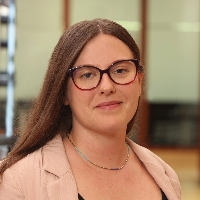
Aleksandra Bergier
Queen's University
Stephen AB 108 Theatre
EDII principles are now firmly embedded in the Canadian research funding ecosystem and researchers are expected to demonstrate clear commitment to them in their funding applications. In response, many applicants have gained valuable new skills and competencies in developing successful EDII statements and narratives. However, the translation of these statements into action is not straightforward and questions arise around meaningful strategies that assist researchers with navigating complex terrain. Practice also demonstrates that some applicants incorporate EDII as an afterthought at a late stage of the grant proposal development process which often happens without the appropriate assessment and planning. This approach substantially hinders their capacity to meaningfully action the EDII principles. This presentation focuses on the pilot training and iterative design process developed at Queen’s University to address these challenges and support researchers with advanced EDII planning and tracking of their progress using the theory of change. We will discuss different tools that were designed to assist the researchers with exploratory self-assessment and planning, including the Diversity and Equity Assessment and Planning (DEAP) Tool for Researchers as well as the EDII in Research Practice Action Plan Workshop and Workbook and the EDII advisory services provided by our team. We will share reflections and lessons learned from the process of designing outcomes-driven action plans as a measurable and impactful approach to EDII.
 May 13, 2024 02:30 pm
May 13, 2024 02:30 pm
Catherine McCleary
University of Calgary

Christopher Chow
University of Calgary
Doll/Herald 72
Breakout session to discuss the best practices of putting together research subcontracts
 May 13, 2024 02:30 pm
May 13, 2024 02:30 pm Carolyn Mullin
Niagara College
Jacqueline Nicol
Resource Manager, Office of Research and Innovation, Humber College
TANYA PERDIKOULIAS
Associate Director, Operations, Office of Research and Innovation, Humber College
DUARTE RIBEIRO
Finance Manager, Office of Research and Innovation, Humber College
JACQUELYNN BROWN
Manager, Research Finance & Administration, Saskatchewan Polytechnic
Imperial 9 40 Rounds
This roundtable discussion is meant to be as interactive as possible, with college research administrators sharing high-level information about the structure of their research offices. Newer offices to seasoned setups that have changed and grown over the years -- all are welcome under this Big Sky across our amazing country, to share best practices, pitfalls, cautions, and lessons learned in how to create a functional and successful applied research office within the broader institutional college setting.
 May 13, 2024 02:30 pm
May 13, 2024 02:30 pm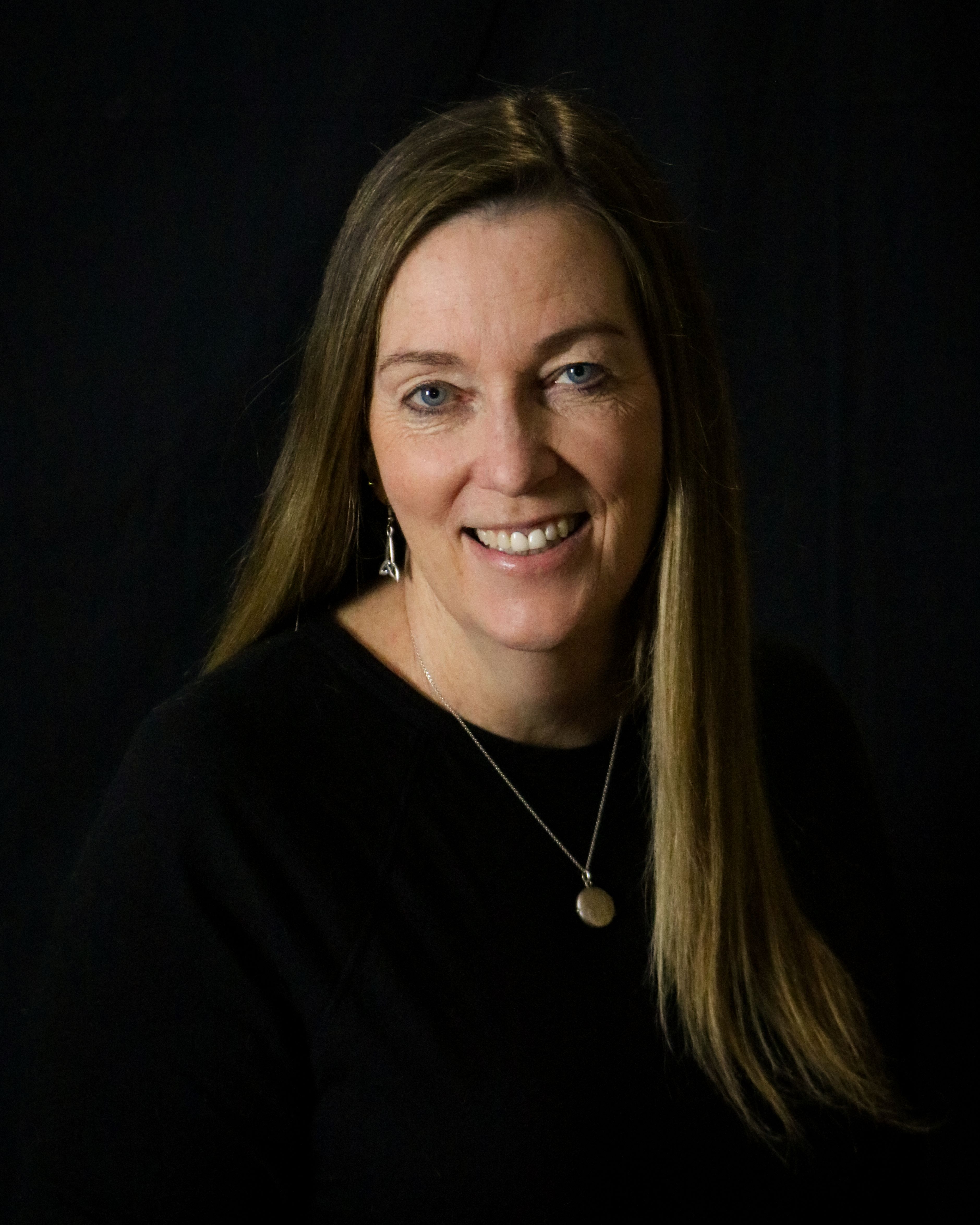
Rachel Syme
Cystic Fibrosis Canada

Leanne Stalker
Health Charities Coalition of Canada; Kidney Foundation of Canada
Imperial 5-7
The charitable sector in Canada has a long record on meaningfully engaging those impacted with chronic disease into ongoing initiatives. The development of targeted resources to assist in engaging the lived experience community has been at the forefront of our sector’s focus, creating innovative strategies with which to open the doors of research. One such engagement area has been the incorporation of community or lived experience reviewers on targeted peer review assessment panels. Different organizations have created strategic ways to incorporate reviewers, leading to changes in the review process in our sector, and ensuring that the research we fund is more connected to the end users that we serve. This session will provide an overview of the experience of two charitable organizations with lived experience engagement in the research process, with a specific focus on peer review. The good, the challenging, and the creative strategies that have been employed.
 May 13, 2024 02:30 pm
May 13, 2024 02:30 pm
Jennifer Drennan
University of Saskatchewan

Dawn Wallin
University of Saskatchewan
Walker/Bannerman 72
There has been growing interest at USask in Research, Scholarly, and Artistic Works (RSAW) Intelligence. As interest in capturing, measuring, and reflecting the work and impact of the institution continues to arise organically, there is a need for coordination and collaboration to meet these needs and make progress toward our shared goals. From institutional rankings to government reporting, to college performance indicators, to sustainability metrics – the presenters will outline how momentum has been building at USask related to RSAW intelligence, and how leaders are taking steps to engage, educate, and respond to the needs of different groups on campus.
 May 13, 2024 03:45 pm
May 13, 2024 03:45 pm
Robin Gauthier
IWK Health Centre

Yasmin Ali
Stephen AB 108 Theatre
As research administrators at IWK Health Centre, we were tasked with quickly and efficiently developing new processes and guidelines for our researchers to support Equity, Diversity, Inclusion, Accessibility and Reconciliation (EDIRA) efforts at IWK Health. We offer a discussion of our experience wherein we will present the changes we implemented, the challenges we faced, and potential solutions. We will also facilitate smaller group discussions to compare strategies, successes and challenges at different institutions. We hope this will be a generative discussion to help promote the integration of EDIRA in our research offices now and moving forward.
 May 13, 2024 03:45 pm
May 13, 2024 03:45 pm
Sherri Kogan
York University
Doll/Herald 72
An overview for research administrators who are not contracts specialists. What do indemnification, intellectual property, survival, warrant and assignment clauses mean and why are they needed? This session will provide a walk through of a sample research contract.
 May 13, 2024 03:45 pm
May 13, 2024 03:45 pm
Karen Mosier
University of Saskatchewan

Mike Folinas
Imperial 9 40 Rounds
In every workplace, conflicts are bound to arise, but the true measure lies in our ability to resolve disputes constructively. Understanding the pivotal role of mediation plays an important role in fostering collaboration and maintaining a healthy workplace. We will navigate the nuances of interpersonal conflict in the workplace with both colleagues and supervisors. Conflict in the workplace is natural and bound to occur when you have people of different backgrounds and perspectives working side-by-side. Specifically, we will dive into communication techniques, active listening skills, and the art of finding common ground. This interactive session is designed to empower you as mediators, enabling you to guide you and your team through challenging situations, transforming conflicts into opportunities for strengthened relationships and enhanced productivity. Using live Slido polls and interactive discussions of strategies that can be utilized to handle disagreements in the workplace, let's embrace the transformative power of mediation, turning potential disruptions into catalysts for positive change.
 May 13, 2024 03:45 pm
May 13, 2024 03:45 pm
Nicole Bennett
UBC Okanagan
Imperial 5-7
As institutions are increasing their investment of resources into the development of interdisciplinary research capacity, particularly in pursuit of NFRF success, the complexities surrounding the effective establishment, management, and sustainability of interdisciplinary research programs and projects are becoming evident. At this session, join the Internal Programs Manager for the VPRI Office at UBC Okanagan, to learn about UBCO’s approach to fostering and evaluating interdisciplinary research. Attendees will gain insights into 4 top challenges to watch for along with practical tips to navigate and address the challenges.
 May 13, 2024 03:45 pm
May 13, 2024 03:45 pm
Christepher Claxton
University of Calgary

Marcelo Suarez
Walker/Bannerman 72
In an era of rapidly advancing technology and increasing demands for strategic decision-making within research institutions, the need for cost-effective and transparent tools has never been more critical. This abstract proposes an approach to building a personalized decision-making tool using OpenAlex, a free index of the world's research ecosystem, coupled with the versatility of Python and the visualization prowess of PowerBI. Our primary goal is to demonstrate how institutions can harness the power of open resource data to create a tailored solution for strategic decision-making. This demonstration will encompass essential metrics such as topics relating to research intelligence, institutional comparative analysis, shifts in researcher focus, collaborative networks among institutions, and more. We emphasize the significance of cost savings, transparency, and the avoidance of 'black-box' solutions prevalent in paid products.
 May 13, 2024 05:00 pm
May 13, 2024 05:00 pmThomson Social Hub Level 1
 May 13, 2024 06:00 pm
May 13, 2024 06:00 pmThomson Social Hub Level 1
 May 13, 2024 06:30 pm
May 13, 2024 06:30 pmImperial 1-6
 May 14, 2024 07:00 am
May 14, 2024 07:00 amLevel 3
 May 14, 2024 07:30 am
May 14, 2024 07:30 amConference Floor Level 3
 May 14, 2024 08:30 am
May 14, 2024 08:30 am Danielle Demiantschuk
University Of Calgary

Anna LeMarquand
University of Calgary

Tanna Giroux
University of Calgary
Imperial 9 40 Rounds
Have you ever wondered about the differences between research awards and grants? Or how supports are different for awards versus grants? In this session, three University of Calgary Research Administrators who support research awards will share their take on how awards differ from grants, how support for awards is unique, how award nominations benefit faculties and institutions, and where awards fit into the Research Administration space. Framed as a conversation, this session will highlight experience from an awards perspective while engaging the audience in discussion around the unique nature of awards’ support and the development of a robust community of practice for awards within the Research Administration space. Topics centering around current opportunities and challenges within the awards space will be discussed, including encouraging nominations from a more diverse pool of nominees, navigating institutional quotas and other institutional requirements for nominations, the distinction between eligibility and competitiveness for award opportunities, and navigating changes to timelines and nomination requirements in the ever-shifting awards ecosystem.
 May 14, 2024 08:30 am
May 14, 2024 08:30 am
Drew Gyorke
Univesrity of Toronto
Stephen AB 108 Theatre
45 Min Breakout / Séance de 45 minutes en petits groups
Whether in conversation stream format or where we have a panel who talks about their adminisrative approach, the key here is to talk about what administration infrastructure institutions are contemplating or implementing, training on management of HE, and how they are dedicating or appointment staff resources to build expertise quickly.
 May 14, 2024 08:30 am
May 14, 2024 08:30 am
Karen Scott
Southern Alberta Institute of Technology
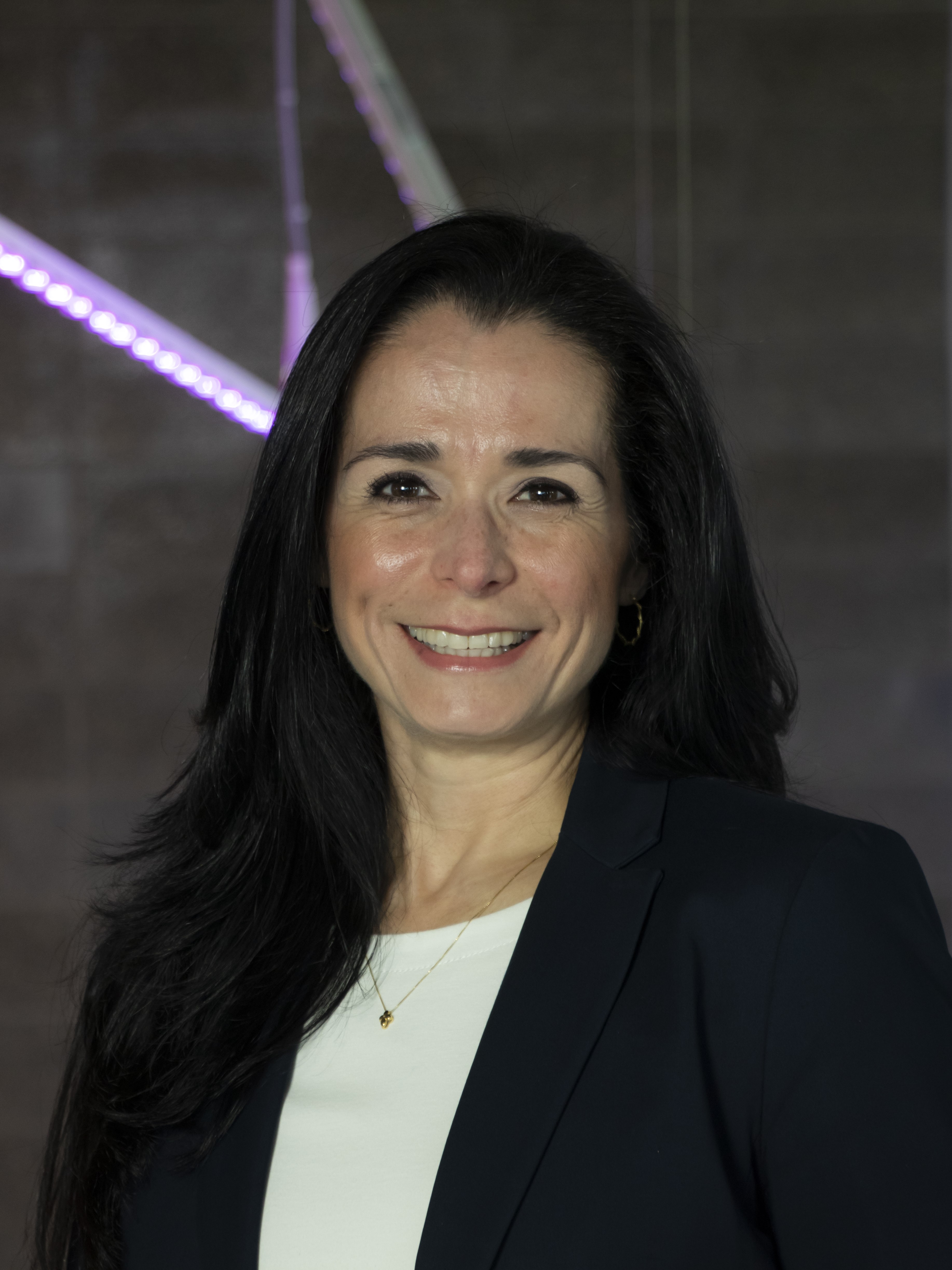
Erika Barrios
SOUTHERN ALBERTA INSTITUTE OF TECHNOLOGY (SAIT)
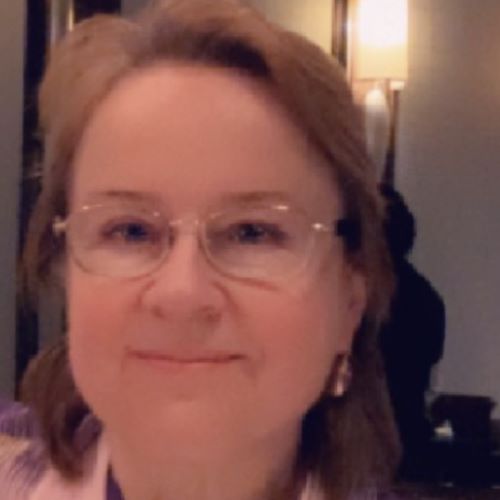
Tonya Hawthorn
Southern Alberta Institute of Technology (SAIT)
Doll/Herald 72
45 Min Breakout / Séance de 45 minutes en petits groups
Are you tired of struggling with contract management? SAIT will share our innovative solution to handle our contracts from the contract request through its execution by leveraging the capabilities of our existing systems; our tool provides a seamless solution that saves our teams time and effort. Managing contracts can be a challenging task for research offices throughout the research lifecycle. However, implementing a Contract Management Solution system can be expensive and may not be a priority for the organization. ARIS at SAIT, in collaboration with our Business Operations Department, has developed a solution using Smartsheets to aid ARIS and the Contracts team in managing various stages of the contracts lifecycle. This solution enables the team to monitor the internal and external review process and track the status of contracts until their final execution.
 May 14, 2024 08:30 am
May 14, 2024 08:30 am
Genevieve Truchon
Social Sciences and Humanities Research Council / Tri-agency Programs Secretariat (TIPS)

Valerie Laflamme
Associate Vice-President, Tri-Agency Institutional Programs at the Social Sciences and Humanities Research Council (SSHRC)
Imperial 1-6
45 Min Breakout / Séance de 45 minutes en petits groups
The Tri-agency Institutional Programs Secretariat (TIPS), housed at SSHRC, administers a portfolio of seven funding opportunities, all of which are institutional except one: 1. Canada Research Chairs 2. Canada Excellence Research Chairs 3. Canada First Research Excellent Fund 4. Canada 150 Research Chairs 5. Canada Biomedical Research Fund 6. Research Support Fund 7. New Frontiers in Research Fund (not institutional but researcher-led) The TIPS Update presentation will feature the most recent updates on programs and policy.
 May 14, 2024 08:30 am
May 14, 2024 08:30 am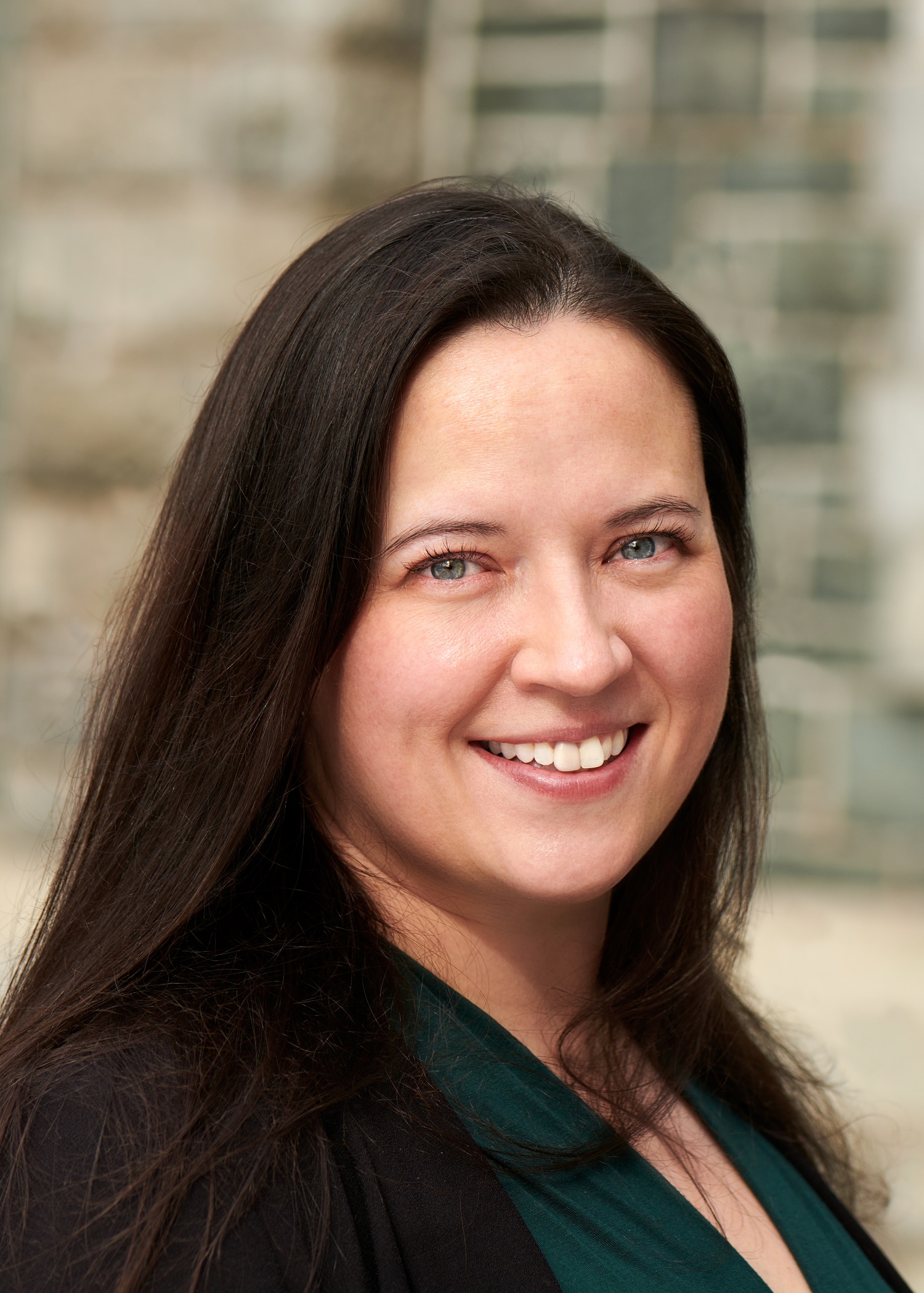
Danielle Goodfellow
Saint Mary's University

Sarah Conrod
Cape Breton University
Walker/Bannerman 72
45 Min Breakout / Séance de 45 minutes en petits groups
Industry Liaison Offices (ILOs) offer valuable expertise to researchers by helping them explore partnership opportunities that compliment discovery-based research through access to programs for collaboration with external partners. These partners include company’s, not-for-profits, NGOs, and government. Despite the benefits of engaging in applied research, many faculty are still unsure of how to get started or are unaware of the services provided by the ILOs. The unawareness often extends to other research administration offices within our universities. The benefits of applied research are measurable as it can lead to expanding research programs, experiential learning opportunities for students, and access to new and impactful funding programs. Building an active community of practice between ILOs and research administrators strengthen a faculty members option to broaden their research program. This also serves to attract new talent and skilled students to the universities from within their school and across Canada and the globe. This session will aim to provide examples of the impact to faculty for engaging in applied research and explore ways in which ILOs can expand and compliment the work done by research administrators by growing a faculty member’s discovery-based portfolio through applied research options.
 May 14, 2024 08:30 am
May 14, 2024 08:30 am Vienna Doenni
Imperial 5-7
45 Min Breakout / Séance de 45 minutes en petits groups
Successes and challenges related to Internal Peer Review and our pilot of the CIHR Mock Review Toolkit for the CIHR Postdoctoral Fellowship
 May 14, 2024 09:30 am
May 14, 2024 09:30 am
Stephanie Warner
University of Calgary

Tony Michel
SSHRC-CRSH

Erica Conte
Unity Health Toronto
Imperial 5-7
45 Min Breakout / Séance de 45 minutes en petits groups
The Declaration on Research Assessment (DORA) aims to address a recognized global problem in research assessment: the misuse and inappropriate reliance on bibliometric indicators to assess individual researchers or their research contributions. DORA provides recommendations for researchers, institutions, funders, publishers and professional societies across all disciplines to improve the ways in which researchers and the outputs of scholarly research are evaluated. The principles of DORA align with many ongoing initiatives related to equity, diversity and inclusion, research data management practices, open access, support for early career researchers, and many others. The responsible research assessment movement is evolving in Canada, and there are many promising practices and challenges to consider. This session will build on our 2023 CCRA workshop. We will provide updates on organizational and funding policies and practices in Canada, hear from attendees about how things have changed at their institution since last year’s session, and provide support for institutions to embrace responsible research assessment practices.
 May 14, 2024 09:30 am
May 14, 2024 09:30 am Jimmy Couturier
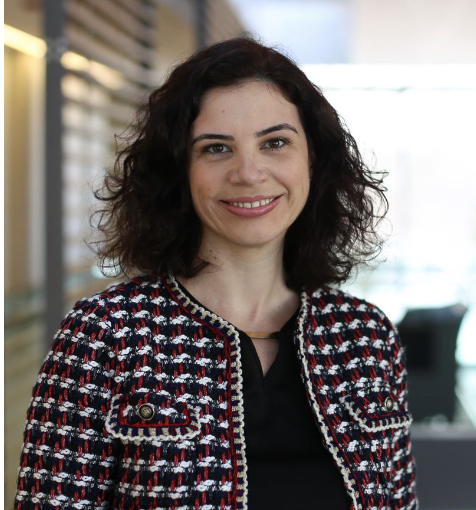
Klodiana Kolomitro
Queen's University
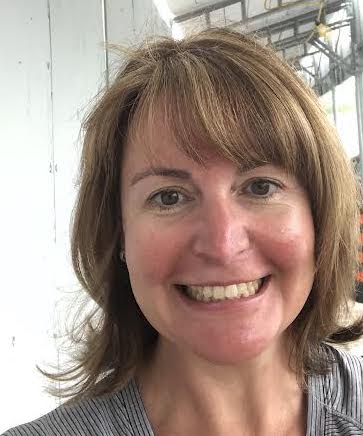
Jennifer Freeman
Stephen AB 108 Theatre
45 Min Breakout / Séance de 45 minutes en petits groups
Undergraduate research is one of the most powerful learning strategies for students as it reinforces critical and creative thinking, encourages problem solving and discovery, and instills curiosity and collaboration. It has also been shown to be the most effective with regards to promoting student engagement (Kuh, 2018) and vital to the research enterprise of an institution for cultivating a diverse and skilled community. CARA has a unique role in bringing together research administrators and helping them overcome disciplinary and institutional boundaries while taking the lead in supporting all aspects of research, including undergraduate research. This panel aligns with the conference theme—Connecting Under a Big Sky: Innovation in Research Administration as the facilitators from three different institutions have collaborated to share strategies, challenges, and opportunities on developing and sustaining an undergraduate research culture. By the end of this session participants will be able to explore conditions and processes that create, support, and sustain undergraduate research and consider different collaboration strategies and institutional alliances as a way of advancing undergraduate research. As such, this panel will further the strategic goal of communities of practice by enabling synthesis and dissemination of information with a view of fostering individual and organization excellence.
 May 14, 2024 09:30 am
May 14, 2024 09:30 am
Dr. Tim Wilson
Associate Vice-President of Research Programs at the Social Sciences and Humanities Research Council (SSHRC)
Imperial 1-6
45 Min Breakout / Séance de 45 minutes en petits groups
Updates on new programs and/or policy changes at the Social Sciences and Humanities Research Council
 May 14, 2024 09:30 am
May 14, 2024 09:30 am
Albana Zeko
NAIT
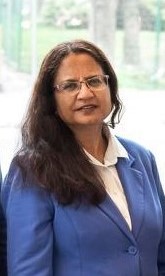
Kakali Majumdar
Bow Valley College
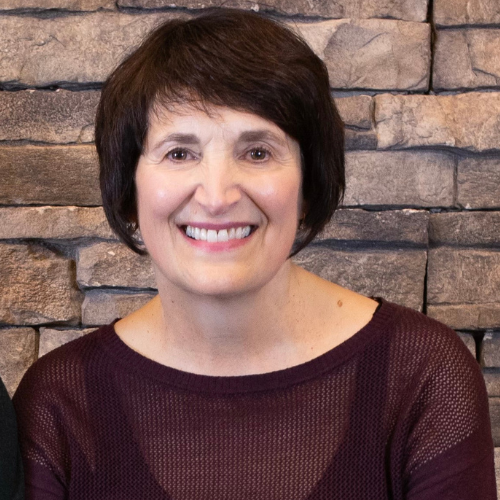
Teresa Bent
SAIT Applied Research and Innovation Services

Tiana Fech
ARIS (Applied Research Innovation Services)/SAIT
Doll/Herald 72
45 Min Breakout / Séance de 45 minutes en petits groups
The Natural Sciences and Engineering Research Council of Canada’s (NSERC) College and Community Innovation Program strongly emphasizes achieving excellence in institutional student research training. It is a significant component of the NSERC’s evaluation criterion and success is measured by the extent to which the training has contributed to students’ practical and professional skills development and its subsequent impact on their careers. Students’ engagement is an integral part of research activities which contributes to the development of a highly skilled labor force. The session will include panelists from three premier colleges in Alberta, including Bow Valley College (BVC), Northern Alberta Institute of Technology (NAIT) and Southern Alberta Institute of Technology (SAIT). The panelists will facilitate conversations among attendees around the topic. The session will provide an opportunity to learn from each other’s best practices and challenges, leading to a deeper understanding of diverse approaches that exist and key success factors and challenges in administering student training.
 May 14, 2024 09:30 am
May 14, 2024 09:30 am
Michael Walesiak
University of Alberta
Walker/Bannerman
 May 14, 2024 09:30 am
May 14, 2024 09:30 am Caroline Morrison
University of Calgary

Jenny McLean
University of Calgary
Pamela Hyde
University of Calgary
Imperial 9 40 Rounds
45 Min Breakout / Séance de 45 minutes en petits groups
How can we meet the research community where they’re at, to ensure they get the right information at the right time? Effective communication is fundamental to successful research administration. The complexity of communication increases with scope, scale, and ambitious institutional goals. Like everyone, researchers navigate a rapidly changing landscape with too much information from too many sources. What is the role of the research services office in this context? Staff from the University of Calgary Research Services Office and Strategic Marketing & Communications team in the VP Research office will share their experience working together to streamline the ways we engage with researchers, and invite discussion about challenges and successes. Some key questions we explore include: • How can research administrators build robust communication practices that support both researchers and administrators? • Targeting communication: what are practical ways to segment the research community audience, rather than addressing them as a homogenous whole? E.g., by career stage, field of research, or something else? What are some methods to determine what is relevant for all faculty members? • What tools or best practices can research administrators implement to enable engagement and support? How can we best leverage a mix of communication channels and formats to serve the research community? Participants can expect to come away from this discussion with ideas and recommendations for how to build on existing communications practice.
 May 14, 2024 10:45 am
May 14, 2024 10:45 am Sarah O'Neill
Research Security, NSERC
Laurie-Eve Rioux
Research Security Centre, Public Safety Canada
Imperial 1-6
This session will provide context of research security in Canada, including an overview of the Government of Canada’s National Security Guidelines for Research Partnerships and the Policy on Sensitive Technology and Affiliations of Concern. We will discuss potential scenarios to help recognize potential risks and demonstrate best practices in maintaining a security-conscious research organization.
 May 14, 2024 10:45 am
May 14, 2024 10:45 am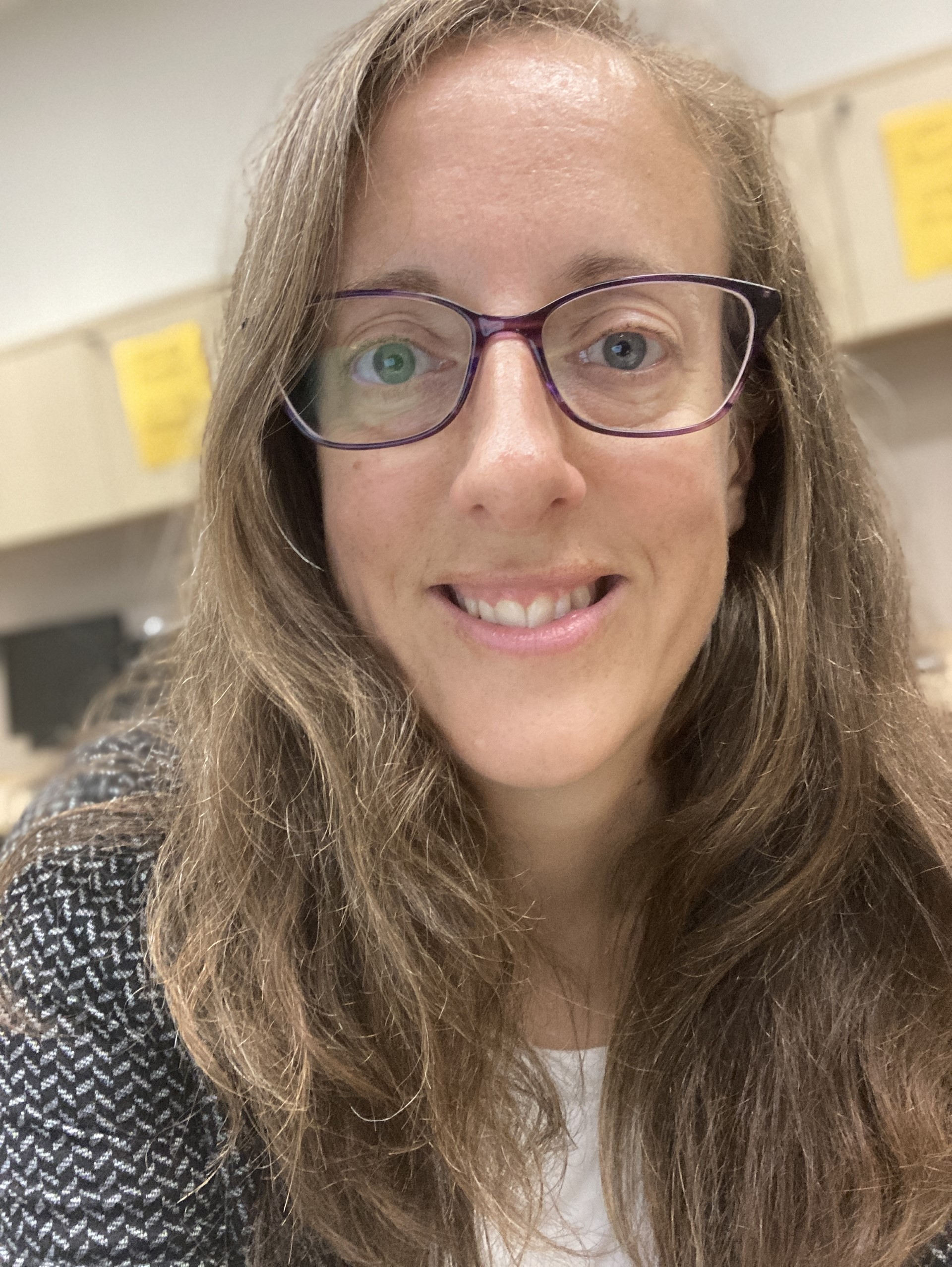
Heather Steel
Toronto Metropolitan Unversity
Walter Herzog
Michael Ante
Laleh Behjat
Imperial 5-7
Have you submitted award nominations and wondered what happens during the evaluation process? This session will feature 3 faculty from the U of C who have served as members on evaluation committees for major external awards (Killam Program, Arthur McDonald Fellowship, NSERC Polanyi Prize). They will speak about their experience evaluating nominations, including how EDI shapes evaluation, how evaluators approach interdisciplinary researchers, what kinds of impact metrics are considered, what they are looking for in letters of support, and what can make or break a nomination. Our panelists will give attendees the kind of inside knowledge that we often don't get and help award facilitators support the creation of stronger nomination packages.
 May 14, 2024 10:45 am
May 14, 2024 10:45 am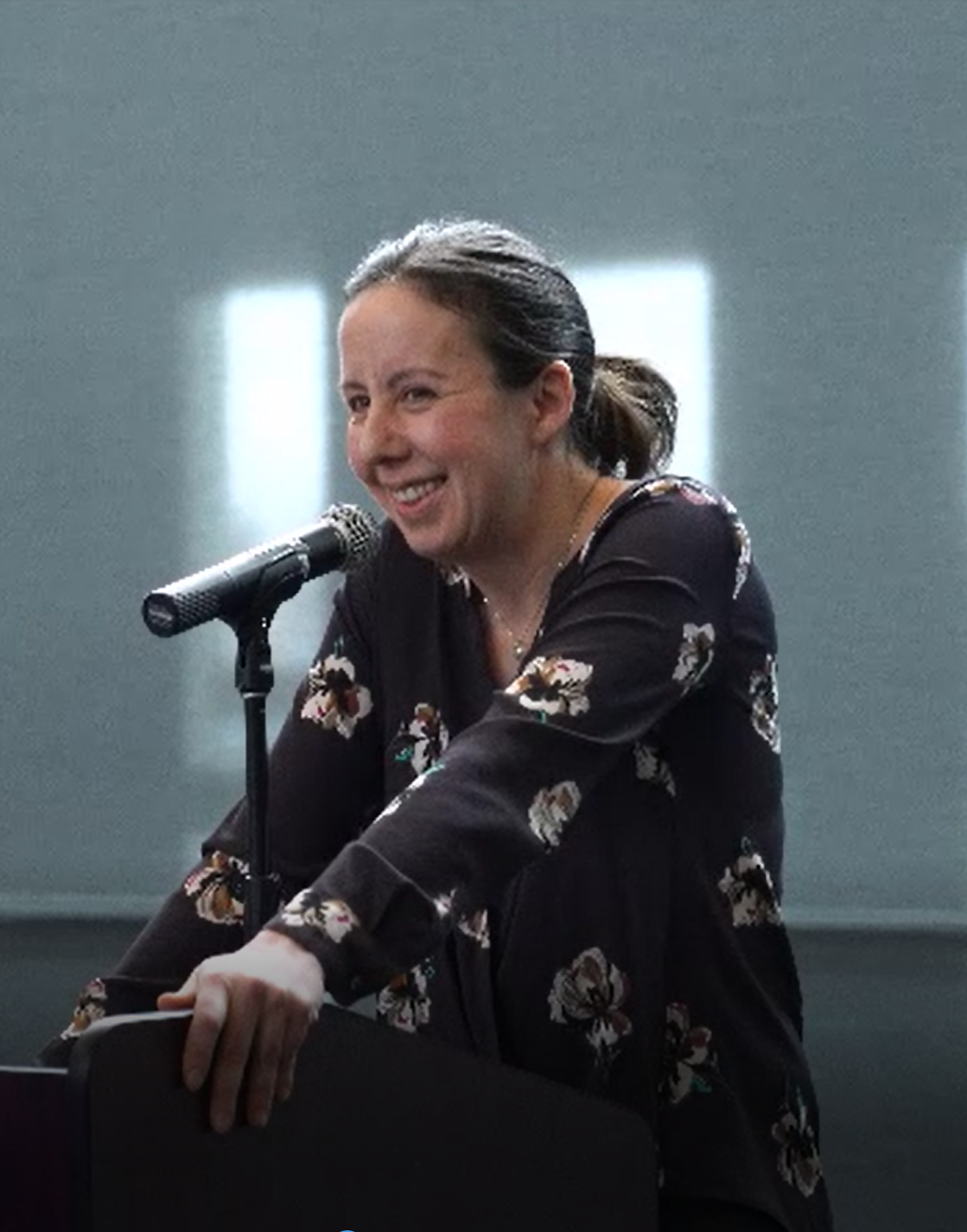
Karine Duhamel
SSHRC
Stephen AB 108 Theatre
Research administration plays an important role in decolonizing the research enterprise. This presentation will focus on some recent initiatives stemming from Setting New Directions to Support Indigenous Research and Research Training in Canada, the strategic plan published by the federal research granting agencies—the Canadian Institutes of Health Research, the Natural Sciences and Engineering Research Council, and the Social Sciences and Humanities Research Council—to fulfill a priority of the Canada Research Coordinating Committee to co-develop with Indigenous Peoples an interdisciplinary research and research training model that contributes to reconciliation. This session will discuss key initiatives of interest to research administrators that are likely to have significant impacts on Indigenous research and researchers, specifically: • a new Tri-Agency Policy on Indigenous Citizenship and Membership Affirmation to support Indigenous self-determination by ensuring that funding, advisory positions, and appointments that are intended for Indigenous people are held by Indigenous people; • an update to the Tri-Agency Guide on Financial Administration to make explicit the use of funds for Indigenous Elders, Indigenous Knowledge Keepers, and Indigenous people affiliated with not-for-profit organizations who are not already being compensated to conduct research; and, • other key initiatives related to the implementation of the strategy, including the work of the Indigenous Leadership Circle in Research, ongoing work to improve the merit review process for Indigenous research, and new ways to address outstanding administrative barriers for researchers and research administrators engaged in Indigenous research.
 May 14, 2024 10:45 am
May 14, 2024 10:45 am Ken Barker
National Cybersecurity Consortium
Doll/Herald 72
The National Cybersecurity Consortium (NCC) is a not-for-profit consortium of Canadian organizations fostering and cultivating world-class cybersecurity-related research, innovation, training, talent development, and entrepreneurship. The NCC aims to support Canada's citizens and its cyber and critical infrastructure while ensuring Canada's global competitiveness and leadership in cybersecurity. The NCC takes a cross-sectorial approach, interested in all Canadian critical infrastructure sectors, and works to build capacity throughout the entire cybersecurity ecosystem. The NCC's approach allows for the development and exploitation of novel intellectual property, spurring innovation across the academic, public, and private corporate spectrum. Under the auspices of the federal Ministry of Innovation, Science and Economic Development (ISED), the NCC will be providing grants to the Canadian cybersecurity ecosystem totalling nearly $65m over 4 years. The NCC’s first full year of operation will end in May of 2024. During that time, we held a call, awarded $11.2m in research funds to 20 projects, launched another, vastly more streamlined call, started a membership campaign, hired 12 full-time staff, and recruited 10 new Board members. We have built a strong and cooperative relationship with our government funder, and have been successful in bringing together post-secondary institutions, not-for-profits, and private sector entities together to build Canadian capacity in cybersecurity. One thing we haven’t done was build a bureaucracy. The NCC mindfully built a funding organization that favoured inventor-owned IP, and pledged to provide a grant process that balanced the need for getting “first in” moneys to projects to kick start them with the need to provide effective funding oversight. We knew it was going to be vital to embrace our core business – providing research funds – and to find organizational stability, so that our marketplace would view the NCC as efficient, effective, and integral yet flexible. We would like to use our session time to talk about our successes, our failures, what we’ve learned, and what we’ve taught our operational partners about breaking down barriers and deterrents to entry.
 May 14, 2024 10:45 am
May 14, 2024 10:45 am Ursula Carmichael
Canadian Research Knowledge Network (CRKN)
Imperial 9
Research generates a huge amount of information across many disconnected systems and technologies. Persistent Identifiers (PIDs) act as labels to uniquely identify research information ‘entities,’ like scholars, institutions, datasets, and publications. PIDs are anchors that help connect information about related entities (e.g., a scholar with their publication) and can enable software systems to effectively exchange information, making them more interoperable. PIDs hold the promise of significant cost and time savings for scholars and institutions, but they also require significant investment and uptake. As digital research infrastructure matures in Canada, PIDs have become an increasingly important component. At the Canadian Research Knowledge Network (CRKN), in partnership with the Digital Research Alliance of Canada (the Alliance), we support two member-driven PIDs consortia: 1) DataCite Canada (DCAN); and 2) ORCID-CA. DCAN provides member institutions with the ability to register digital object identifiers (DOIs) for datasets and other research outputs, while ORCID iDs are PIDs for people. On behalf of the Canadian Persistent Identifier Advisory Committee (CPIDAC), for the last two years, we have undertaken community consultations to help identify challenges and opportunities to implement PIDs in Canada. With a National PID Strategy in place, we aim to be able to concretely address the question of which PIDs can help Canadian research stakeholders address which problems. This session will 1. Present an overview of Persistent Identifiers (PIDs) and central PID projects in Canada 2. Explore how research administrators will be essential to the continued growth and use of PIDs 3. Provide a significant update on the work we have done since CARA 2022.
 May 14, 2024 10:45 am
May 14, 2024 10:45 am Glaucia Lima
Faculty of Arts and Science, University of Toronto

Kadi-Ann Hinds
University of Toronto
Walker/Bannerman 72
Global research partnerships are integral to advancing knowledge and making it accessible to broad audiences and applications. DiscoverResearch is a new tool to highlight, celebrate and promote University of Toronto experts across all disciplines. The tool connects U of T’s research expertise with media, industry, and academic collaborators, while simultaneously helping faculty keep track of their work. With automatic harvesting of data from trusted sources, DiscoverResearch offers a comprehensive view of a researcher’s outputs and scholarly activities, and their impact beyond academia, and allows researchers to tell their own in their own words. This session covers U of T’s journey to launching DiscoverResearch. We will present a case study on how the Faculty of Arts and Science – one of our largest divisions, with over 1,000 faculty and 40 academic units – has successfully engaged its faculty members. They achieved this using a tailored approach that addressed the specific concerns and expectations of each unit. We will also highlight the vital role played by our research administration officers throughout the process. This session will provide best practices for engaging users in new tools and key functional and technical considerations to launching a new institutional platform. We will share lessons learned, creative uses of resources, and how to lead cross-divisional, high-impact projects. You can view the tool here: https://discover.research.utoronto.ca/
 May 14, 2024 11:45 am
May 14, 2024 11:45 am Jas Michalski

Benjamin Cyr
NSERC and SSHRC
Robin Craig
Associate Vice-President, Research Grants and Scholarships
Robbyn Plumb
Associate Vice-President, Research Technology Partnerships
Andrea Benoit
Director, Program Planning and Operations
45 Min Breakout / Séance de 45 minutes en petits groups
Imperial 1-6
Updates on new programs and/or policy changes at the Natural Sciences and Engineering Research Council
 May 14, 2024 11:45 am
May 14, 2024 11:45 am Matthew Lucas
Melanie Adams
Aurora College
Ian Milligan
University of Waterloo
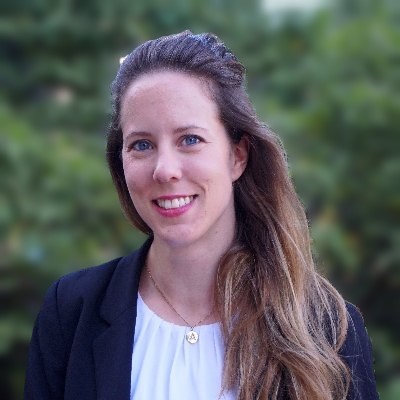
Chantal Ripp
University of Ottawa
Stephen AB 108 Theatre
This discussion is intended to be part I of two back-to-back 45-minute sessions, hosted by SSHRC, CIHR and NSERC. As of January 2024, over 200 institutional research data (RDM) management strategies have been published as required by the Tri-Agency Research Data Management Policy. These documents represent a wealth of information not only about the state of research data management in Canada, but also about the future direction of Canada’s institutions. A team of researchers, led by Kelly Cobey from the University of Ottawa and supported by the agencies and the Digital Research Alliance of Canada is undertaking a mapping to summarize the content of strategies, namely current and future RDM developments, engagement, monitoring, collaboration, and infrastructure. The Canadian post-secondary RDM community was also recently convened at the University of Waterloo to discuss challenges, working strategies and emerging practices at universities and colleges. This event brought together around a hundred professionals, drawn equally from research administration, libraries, and information technology units. The preliminary results of these activities will be presented during the panel, followed by a discussion with institutions and researchers around next steps that institutions might be taking, and the challenges and opportunities of operationalizing RDM in the Canadian research enterprise. Panelists and moderators for the sessions are only tentative.
 May 14, 2024 11:45 am
May 14, 2024 11:45 am
Clint Westgard
University of Calgary
Imperial 5-7
Researchers in faculties of medicine do not typically consider SSHRC when looking for funding for their projects. Yet SSHRC is open to projects with health outcomes, provided the primary outcomes of the study advance knowledge and understanding in social sciences and humanities disciplines. The Partnership Stream, in particular, offers many opportunities for those involved in community-engaged research. This seminar will look at strategies to encourage health researchers to view SSHRC opportunities as a fit for their research, as well as how to best frame their research for a SSHRC audience and how to build a SSHRC program of research. Successes and challenges from efforts in the Cumming School of Medicine to increase SSHRC applications will be discussed.
 May 14, 2024 11:45 am
May 14, 2024 11:45 am
Rachel Syme
Cystic Fibrosis Canada
Doll/Herald 72
The Network of Networks (N2, www.n2canada.ca) is a non-profit alliance of clinical research organizations within Canada working collaboratively to enhance clinical research performance. By providing a platform for its member organizations to share information and co-create resources, N2 helps ensure its members operate at the leading edge of practice and that the research they conduct embodies integrity and quality. Among N2 member organizations are the operational leaders of research from healthcare, industry, universities, and research networks. This session will provide an overview of N2 supports available to help your organization maximize the success of its clinical research enterprise, as well as resources to support your clinical research professionals in their day-to-day roles.
 May 14, 2024 11:45 am
May 14, 2024 11:45 am
Gen Clark
University of Saskatchewan
Sanjukta Choudhury
College of Education
Imperial 9 40 Rounds
It can be difficult for staff and other non-traditional researchers within academia to conduct their own independent research as the prevailing research culture and research administration policies cater to faculty researchers. However, fostering a richer research culture inclusive of non-faculty researchers creates positive outcomes for both the institutions and individuals involved. This presentation aims to inform and raise awareness of the non-traditional researchers and scholars at our research institutions. The presenters are both research development professionals with experience conducting professional practice research. The session will be of interest to both CARA members interested in leveraging their research backgrounds to conduct their own research and scholarly work, as well as those who advise non-traditional researchers on occasion. We’ll discuss related theory and trends, such as the 3rd space professional and alt-ac career path, as well as the Hidden Research movement in the UK. We’ll tell stories of non-traditional scholars and the challenges they face in terms of time, skills, eligibility, and professional recognition. We’ll also dive into issues to consider, such as ethics, funding, and publishing. Finally, we’ll highlight some resources available within CARA and elsewhere.
 May 14, 2024 11:45 am
May 14, 2024 11:45 am
Laura Bredahl
University of Waterloo

Qing Liu
Western University
Walker/Bannerman 72
Researchers, research units and institutions are increasingly asked to speak to the value and impact of their research, to increase the competitiveness for grant applications, award nominations, promotion and tenure applications, for recruiting students and trainees, and attracting potential partners. To meet the demand, many institutions have employed bibliometrics and research impact specialists to provide highly tailored research intelligence services. While most of these specialists are in the Library, some of them are in the Research Office. In this presentation, we will introduce the bibliometrics and research impact supports and services provided in the University of Waterloo Library in collaboration with their Research and Planning offices, and the supports and services provided in Western University’s Research Office, and the opportunities and challenges we face within these organizational structures. We will discuss the differences in the services that we provide at our respective institutions and provide an opportunity for attendees to share more about the needs for research intelligence services and supports within their own institutions.
 May 14, 2024 12:30 pm
May 14, 2024 12:30 pmConference Floor Level 3
 May 14, 2024 01:30 pm
May 14, 2024 01:30 pm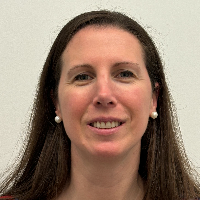
Dominique Brisebois

Bouchra Assouli
Canada Foundation for Innovation
Imperial 1-6
This session will focus on financial post-award topics. It will include an overview of the financial trend analysis that CFI now performs on an annual basis. CFI staff will also discuss the way CFI pays and monitors IOF, what templates and resources are available to calculate eligible costs under the IOF and invite participants to share their experiences with reporting salary costs and facility charges.
 May 14, 2024 01:30 pm
May 14, 2024 01:30 pm
Chantal Ripp
University of Ottawa
Aaron Franks
First Nations Information Governance Centre

Karine Duhamel
SSHRC
Jackie Ottmann
First Nations University

Keeta Gladue
University of Calgary
Stephen AB 108 Theatre
This discussion is intended to be part II of two back-to-back 45-minute sessions, hosted by SSHRC, CIHR and NSERC. As of January 2024, over 200 institutional research data management strategies have been published as required by the Tri-Agency Research Data Management Policy. These documents represent a wealth of information not only about the state of research data management in Canada, but also about the future direction of Canada’s institutions. In addition, there has been much work in the community to support RDM protocols and Indigenous data sovereignty for research by and with the First Nations, Métis and Inuit. A team of researchers, led by Kelly Cobey from the University of Ottawa and supported by the agencies and the Digital Research Alliance of Canada is undertaking a mapping to summarize the content of strategies, namely current and future RDM developments, engagement, monitoring, collaboration, and infrastructure. This second session will present the preliminary findings of this study with respect to Indigenous Research Data Management and will convene institutions and researchers to discuss how to support Indigenous data sovereignty and data management. The panelists will highlight examples of initiatives and emerging best practices. Panelists and moderators for the sessions are only tentative.
 May 14, 2024 01:30 pm
May 14, 2024 01:30 pm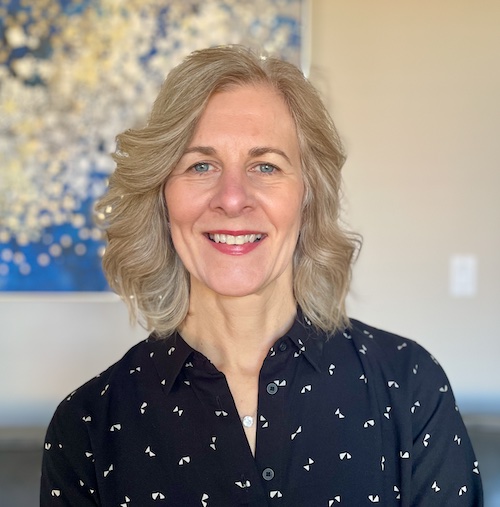
Elizabeth Russell-Minda
Western University
Imperial 5-7
This session will focus on exploring and crowd-sourcing the various methods through which academic institutions across Canada facilitate and support co-applicants from their institutions who partner on externally led SSHRC Partnership Grants. Nearly all U15 academic institutions, including Western University (where I manage the SSHRC Partnership Grant programs), as well as non-medical/doctoral universities, and colleges across Canada, provide co-applicant support in the form of cash and in-kind contributions on SSHRC Partnership Grants. Although supports can vary, these contributions are strategically and purposefully aligned, as many Canadian academic institutions include the goal of developing robust, equitable, diverse, and inclusive partnerships in their research strategic plans. Therefore, fostering productive and engaging research partnerships with communities and sectors at local and global levels is a significant focus for many Canadian universities and colleges. SSHRC Partnership Grants are often identified as high-reward and important for building innovative and engaging collaborations across partners and organizations; they are noted for strengthening academic and non-academic sector knowledge exchange, frequently resulting in impactful outcomes for society. This session is in line with CARA’s strategic focus on building communities of practice where members share information and ideas towards the common goal of knowledge dissemination and learning. The session will feature a brief presentation and break-out group discussions where current practices (financial, brokering, communications), experiences, barriers, and new knowledge will be explored and shared with others in a collaborative and engaging forum.
 May 14, 2024 01:30 pm
May 14, 2024 01:30 pm
Robyn Roscoe
Lyric Management

Karen Mosier
University of Saskatchewan
Imperial 9 40 Rounds
A brief overview of the Research Administration Certificate program at Mohawk College from instructors, followed by panel of current and past students. Topics will include the opportunities and challenges of the program and courses, how the learning and the certificate contribute to personal, professional, and career development, and tips-and-tricks for successfully completing the program. Outline: • 10 mins intro by instructors (5 min each) • 20 min panel – 4-5 students • 15 min Q&A
 May 14, 2024 01:30 pm
May 14, 2024 01:30 pm
Rachel Syme
Cystic Fibrosis Canada

Leanne Stalker
Health Charities Coalition of Canada; Kidney Foundation of Canada
Doll/Herald 72
HCCC, a member-based organization, is dedicated to advocating for sound public policy on health issues and promoting the highest quality health research. Recently, The HCCC has reestablished a Research Committee with the intent of streamlining research administration through the health charity sector in Canada. Developing best practice documents, utilizing multi sector experience to build common messaging, and creating unique interdisciplinary collaboration, will be beneficial to the research environment. The potential impact of health charities on research is often under-estimated, and opportunities for partnership and policy development leadership is underutilized by the research community. By bringing together research administrators HCCC seeks will streamline leveraging of expertise, while reducing bandwidth limitations which are common in this sector for the benefit of the entire research community.
 May 14, 2024 01:30 pm
May 14, 2024 01:30 pm
Alexander Karabanow
University Health Network

Daeniell Miller Kanjilal
University Health Network
Walker/Bannerman 72
Canada has a fragmented regulatory approach to research involving humans with various regulations and guidelines for research ethics, research integrity, conflict of interest, privacy, biosafety and radiation, and other national and international standards for oversight of biomedical clinical trials. This complex regulatory environment makes it difficult for research institutions to be able to adequately oversee the conduct of research involving humans. The Research Ethics Board (REB) has been the main regulatory body to take on many of the responsibilities for the oversight of research involving humans even though their focus is on the review of ethical feasibility and appropriateness. The University Health Network (UHN) in Toronto has implemented a systems approach as a way of establishing more effective oversight for all research involving humans: a systems based Institutional Authorization (IA) model for research involving humans. Such a systems approach includes the REB as well as other important stakeholders in the conduct or research and research integrity. For example, other compliance/regulatory stakeholders as well as service providers and impact assessment groups would review research proposals before the start of research activities. Despite the gap in the literature with respect to REB quality and performance assessments, there has recently been increased interest in a more effective approach to protect the safety of human research participants. This innovative approach promotes a safety and quality culture and provides the institution with a mechanism to monitor and feedback to leadership about system processes. This model allows for the management of its people, processes and tools to more effectively minimize risk and improve efficiencies. The use of Business Analytics has further allowed the model to be refined and to use predictive capabilities to the outcomes of granting Institutional Authorization and study startup. IA oversight structures will facilitate the transformation into becoming efficient learning healthcare institutions where patient care, education and research are better integrated.
 May 14, 2024 02:30 pm
May 14, 2024 02:30 pm
Brandi Povitz
University of Calgary
45 Min Breakout / Séance de 45 minutes en petits groups
Doll/Herald
Research administrators, and grant facilitators in particular, often pride themselves on providing bespoke service to researchers. However, this takes enormous time and energy.
Toolkits containing resources that address frequently asked questions, provide expert guidance on important topics, or solve common pain points not only add value for researchers but also help streamline our work. But developing resources takes time and energy and research administrators are busier than ever. What’s a research administrator to do?
This session will provide tips based on the Cumming School of Medicine Grant Development Office’s experience over the past five years for building a resource toolkit from the ground up. A broad spectrum of resources, from simple to complex, will be showcased to spark imaginations and inspire research administrators to build their own toolkits.
 May 14, 2024 02:30 pm
May 14, 2024 02:30 pm
Keeta Gladue
University of Calgary

Sara Anderson
Senior Manager, Indigenous Research at the University of Waterloo
Katie Big-Canoe
Indigenous Research Specialist, Inclusive Research Excellence & Impact, Western Research, Western University
Carly Renaud
Manager, Indigenous Research and Development, First Peoples’ Centre, Canadore College
Lerato Chondoma
UBC
Stephen AB 108 Theatre
Workshop Overview: Join us for an engaging and insightful panel featuring members of the Network of Indigenous Research Administrators (NIRA). This panel discussion will delve into critical aspects of Indigenous research, focusing on topics related to community engagement, Indigenous data sovereignty, Indigenous research financial complexities, and the challenges and opportunities in the emerging research administration field. We will discuss what it means to serve not only our post secondary institutions but also Indigenous communities and how we are navigating these tensions. The workshop will also shed light on the formation and goals of NIRA, exploring how this network fosters collaboration and community among its members. Agenda: 1. Introduction (15 minutes): • Overview of the workshop and its objectives. • Brief introduction to NIRA and its role in supporting Indigenous research administrators. 2. Building Our Community: NIRA • Origins and goals of NIRA – How the network came to be. • Collaboration among NIRA members – Success stories and ongoing initiatives. • Opportunities for audience engagement and networking. 3. Serving Our Roles in Communities (institutional and Indigenous) • Panelists share experiences and insights on navigating roles within both institutional and Indigenous communities. • Discussions on the challenges and opportunities of serving in dual capacities. 4. Challenges: Institutional Barriers • Identification and exploration of systemic barriers within the Indigenous research administration landscape. • Panelists share personal experiences and perspectives. • Open floor for questions and discussions. 5. Successes • Highlighting success stories and best practices in overcoming institutional barriers. • Sharing strategies for creating supportive research and training environments. 6. Community Engagement and Indigenous Data Sovereignty • In-depth discussion on the importance of community engagement in Indigenous research. • Exploration of Indigenous data sovereignty principles and their implications. • Case studies and practical examples. 7. Sustainable Resources: People, Knowledge, and Funding • Examination of sustainable resource models for Indigenous research, covering human resources, knowledge exchange, and funding. • Panelists share insights into building and maintaining supportive research environments. 8. Q&A and Open Discussions (15 minutes): • Participants are encouraged to ask questions and engage in open discussions with the panelists. Target Audience: This workshop is designed for research administrators, educators, and anyone interested in understanding and addressing the challenges and successes in Indigenous research administration. Expected Outcomes: Participants will: • Gain insights into the systemic barriers within the Indigenous research administration landscape, • Discover strategies for overcoming challenges, • And develop a deeper understanding the collaborative efforts of NIRA in creating supportive environments for Indigenous research. This workshop aims to foster a deeper understanding of Indigenous research administration, offering a platform for knowledge-sharing, collaboration, and dialogue. Participants will leave with valuable insights, practical strategies, and a network of contacts to enhance their engagement with Indigenous research. We look forward to your active participation in this enriching and informative workshop.
 May 14, 2024 02:30 pm
May 14, 2024 02:30 pm Vienna Doenni

Priya Jaggi
Grant Development Office/University of Calgary
Imperial 5-7
We will introduce our game-changing Project Management Toolkit and how we use it to help researchers from postdocs to senior faculty in their grant application development.
 May 14, 2024 02:30 pm
May 14, 2024 02:30 pm
Martin Cyr Hicks
Social Sciences and Humanities Research Council / Conseil de recherches en sciences humaines
Imperial 1-6
Emerging researchers and research trainees are facing many challenges integrating within the greater research ecosystem. To help clarify and address these challenges, the Talent Evaluation, which will be published in the spring of 2024, as well as the Tri-Agency Training Strategy highlight the need to better support students and postdoctoral researchers through our funding programs and prepare them for a wider range of career paths. A representative from SSHRC's Research Training Portfolio will present updates on these initiatives and on our Talent programs. / Les nouveaux chercheurs, nouvelles chercheuses et les stagiaires en recherche sont confrontés à de nombreux défis dans l’intégration au sein du grand écosystème de recherche. Pour aider à clarifier et à relever ces défis, l'Évaluation Talent, qui sera publiée au printemps 2024, ainsi que la Stratégie des trois organismes en matière de formation soulignent la nécessité de mieux appuyer les étudiants de même que les chercheurs et chercheuses au niveau postdoctoral avec nos programmes de financement et de mieux les préparer à un plus large éventail de parcours professionnels. Un représentant du Portefeuille de la formation en recherche du CRSH présentera des mises à jour sur ces initiatives ainsi que sur nos programmes de formation en recherche et de perfectionnement des compétences.
 May 14, 2024 02:30 pm
May 14, 2024 02:30 pm Marisa Ruccolo
Clarivate

Dane Berry
University of Victoria

Kyle Demes
OurResearch

Jeffrey Waldin
InfoEd Global

Sherryl Petricevic
Profound Impact

Jason Porter
Cayuse
Cal Murgu

Shannon OReilly
Digital Science
Walker/Bannerman 72
Research institutions of all types and sizes rely on information about their research activities to build, implement, and evaluate their research strategies. While specific data, system, and analytical needs may vary across institutions, solutions are available on the market for many of the common challenges that institutions face when collecting, processing, and analyzing data relating to their research enterprise. This 2-part session will feature a showcase of 10-minute presentations from each vendor on the solutions they offer for research institutions. All vendors will be present for the remainder of the conference for individual follow-up conversations.
 May 14, 2024 03:45 pm
May 14, 2024 03:45 pm
Keeta Gladue
University of Calgary

Sara Anderson
Senior Manager, Indigenous Research at the University of Waterloo
Katie Big-Canoe
Indigenous Research Specialist, Inclusive Research Excellence & Impact, Western Research, Western University
Carly Renaud
Manager, Indigenous Research and Development, First Peoples’ Centre, Canadore College
Lerato Chondoma
UBC
45 Min Breakout / Séance de 45 minutes en petits groups
Stephen AB 108 Theatre
This is a Part 2 of a Indigenous Research Administration Panel Session
 May 14, 2024 03:45 pm
May 14, 2024 03:45 pm Regina Tiba
University of Victoria

Aaron Brewer
University of Victoria

Melissa Joyce
University of Victoria
Imperial 5-7
45 Min Breakout / Séance de 45 minutes en petits groups
Various topics will be covered and discussed including researchers being paid through their grants, relocation, travel vs living costs, recording timesheets for audits.
 May 14, 2024 03:45 pm
May 14, 2024 03:45 pm
Stewart Fast
University Canada West

Dana Chamot
MacEwan University

Alysha Monk
Doll/Herald 72
This session looks at the experience of three teaching focussed institutions in establishing research offices. The early stages of research office development are pivotal and while there are fundamental activities and procedures that are common to all offices there is also a substantial amount of difference in the approach, prioritization, direction and strategy that our research offices have taken. Each office has played a unique role in building and supporting new cultures of research partnerships and interdisciplinary collaboration. We will draw from a range of approaches, successes, and challenges. Capilano University started its Office of Creative Activity, Research and Scholarship 5 years ago, University Canada West established its first Office of Research and Scholarship less than 1 year ago and MacEwan University’s Office of Research Services is approximately 12 years old.
 May 14, 2024 03:45 pm
May 14, 2024 03:45 pm
Kyle Demes
OurResearch

Dane Berry
University of Victoria
Marisa Ruccolo
Clarivate

Jeffrey Waldin
InfoEd Global

Sherryl Petricevic
Profound Impact

Jason Porter
Cayuse
Cal Murgu

Shannon OReilly
Digital Science
Walker/Bannerman 72
Research institutions of all types and sizes rely on information about their research activities to build, implement, and evaluate their research strategies. While specific data, system, and analytical needs may vary across institutions, solutions are available on the market for many of the common challenges that institutions face when collecting, processing, and analyzing data relating to their research enterprise. This 2-part session will feature a showcase of 10-minute presentations from each vendor on the solutions they offer for research institutions. All vendors will be present for the remainder of the conference for individual follow-up conversations.
 May 14, 2024 03:45 pm
May 14, 2024 03:45 pm
Alda O'Grady
Simon Fraser University
Imperial 1-6
In 2023, the Government of Canada announced the recipients of the 2022 Canada Excellence Research Chairs (CERC) competition, providing institutions with the opportunity to attract internationally renowned researchers. As of 2024, many chairholders have commenced or are about to begin their appointments at their respective institutions. While each award brings significant resources to the institution, it also entails new administrative and reporting obligations, including the development of Equity, Diversity, and Inclusion (EDI) action plans. This session offers a forum for administrators responsible for CERC awards to convene, establish a community of practice, and share best practices, lessons learned, and strategies for addressing challenges related to the administration of these prestigious awards.
 May 15, 2024 07:00 am
May 15, 2024 07:00 am May 15, 2024 07:30 am
May 15, 2024 07:30 amConference Floor Level 2
 May 15, 2024 08:30 am
May 15, 2024 08:30 am
Erica Conte

Kristen Korberg
CARA Career Path Task Force (note: Kristen Korberg is now with KLK Research Consulting but is presenting as Chair of the CARA Career Path Task Force).
Walker/Bannerman 72
45 Min Breakout / Séance de 45 minutes en petits groups
The CARA Career Path Task Force will present the findings of their 2023 survey of the CARA Membership and determine next steps for the task force.
 May 15, 2024 08:30 am
May 15, 2024 08:30 am Emma Koiston
University of Calgary

Tempest Emery
Stephen AB 108 Theatre
45 Min Breakout / Séance de 45 minutes en petits groups
Exploring institutional practice, this session will be a discussion on the challenges faced in administering sub-grants funded through U.S. federal agencies, such as NIH, DoD, and NSF. Examples of some of the challenges faced by the UCalgary Research Services Office will examine several aspects of managing sub-grants, as both a prime award-holder working with numerous sub-sites, and as a sub-recipient working with an external institution or pass-through-entity. A short presentation will outline: • complexities with both application and post award processes as a leading institution that is collaborating with multiple sub-sites; • requests made by a leading institution, when UCalgary is a sub-site, and the challenges of managing the administrative burden inherent in those requests; • navigation of an increased number of requests for attestation of compliance with various pieces of U.S. legislation when acting as a sub-site. These examples will outline the points of difficulty the UCalgary team experienced in supporting sub-grant files and will summarize the actions taken to reach a resolution to each challenge. Targeted questions will be posed to the audience throughout a slide-show presentation to facilitate discussion and gain insight into how such matters are handled by other institutions.
 May 15, 2024 08:30 am
May 15, 2024 08:30 am
Dr. Vicki Squires
Sanjukta Choudhury
College of Education
Doll/Herald 72
45 Min Breakout / Séance de 45 minutes en petits groups
This presentation explores the intricate process of integrating Equity, Diversity, and Inclusion (EDI) across diverse research domains, drawing insights from researchers across various disciplines. Funded by the National Organization of Research Development Professionals (NORDP), our recent study delves into researchers' experiences with EDI integration, gathering over 200 survey responses to identify barriers hindering meaningful inclusion. This session aims to share the findings, sparking discussion on potential actions to address these barriers and fostering collaboration. By navigating the complex landscape of EDI in research, we recognize both progress and areas needing refinement, offering insights poised to reshape perspectives and promote a new era of inclusive practices. Highlighting specific barriers identified by researchers, the presentation will discuss strategies for overcoming challenges. The outcomes are expected to catalyze enhanced collaboration among Research and Development professionals worldwide, contributing to a more inclusive and equitable research landscape. Join us in this conversation as we collectively move towards a future where diversity and inclusion form integral components of the research endeavor.
 May 15, 2024 08:30 am
May 15, 2024 08:30 am
Sajjad Surani
Mohawk College, Ontario, Canada

Robyn Roscoe
Lyric Management
Imperial 1-6
45 Min Breakout / Séance de 45 minutes en petits groups
Project Background: Research Administration and Grants Management is a field whereby professionally trained individuals provide active support to researchers in an academic or non-academic settings. The support spans start from budgeting, financial administration of grants, financial monitoring, compliance with national and international regulatory requirements, submission of grants, coordination, and communication with funding agencies, till coordinating the close out of grants to the satisfaction of the grantor as well as the parent institution. Its a growing field around the world but very few studies have been done to ascertain the impact of research administration on improvement in project outcome or facilitation to the investigators. The study through a survey aims to collect feedback from researchers belonging to institutions from a developing country (Karachi, Pakistan) and a developed country (Alberta, Canada), on how can research administrator help researchers do a better job. Project Objectives The outcome and process objectives of this study are as follows: Outcome Objectives: a. To identify specific actions that research administrators can take to enhance their performance that leads to better delivery of project objectives. b. To identify what resources would be required by the research administrators to implement the suggestions made to enhance their performances and uplift their professional competencies. Process Objectives a. To conduct a survey amongst the faculty members of institutions (one in developing country and one in the developed country), to identify possible ways research administrators can enhance their performance. b. To conduct analyses in the study findings Methodology The study will use convenient sampling to design and implement a survey at Healthcare and Academic institutions within Sindh, Pakistan, and Alberta, Canada. The survey will be conducted through people responding through Google Forms circulated via email or personal invitation by the researchers. The data collected will be exported to Microsoft Excel and analyzed using basic statistics and descriptive. The total targeted respondents shall be 25-30 people from each country.
 May 15, 2024 09:30 am
May 15, 2024 09:30 am
Martha Wallace
Director of Research Security, University of Calgary
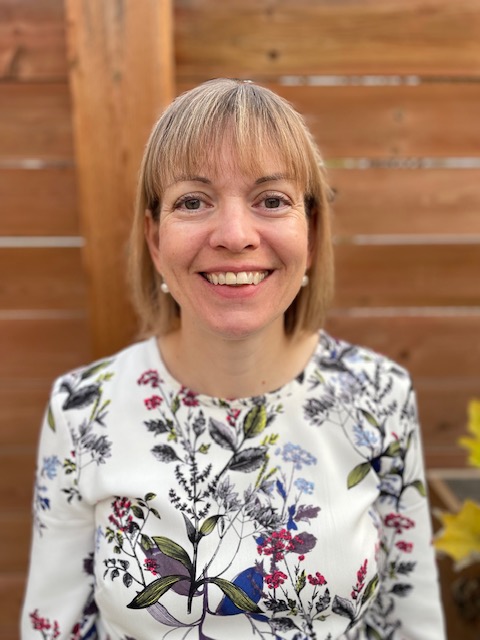
Jacqueline Littlewood
Director of Research Security, University of Alberta
Erin Dorgan
Regional Advisor Prairies, Research Security Center, Public Safety Canada
Sarah O'Neill
Research Security, NSERC
Stephen AB
Canadian research innovation is fueled by open scholarship and international collaboration. Yet the open and collaborative nature of Canada’s research ecosystem also makes it vulnerable to unwanted access, theft, and misuse. With the launch of new research security requirements for federal grant applications, safeguarding research is quickly becoming a priority for postsecondary institutions across Canada. This panel brings together experts from the Alberta postsecondary sector and the federal government to discuss approaches to protecting the integrity of Canadian research. Topics include the establishment of regional Research Security Centers across Canada, the building up of research security programs at UCalgary and UAlberta, and postsecondary collaboration on a hub-and-spoke model for safeguarding research in Alberta. Each panelist will explore the importance of a collaborative approach to strengthening the research security posture in Alberta and across Canada.
 May 15, 2024 09:30 am
May 15, 2024 09:30 am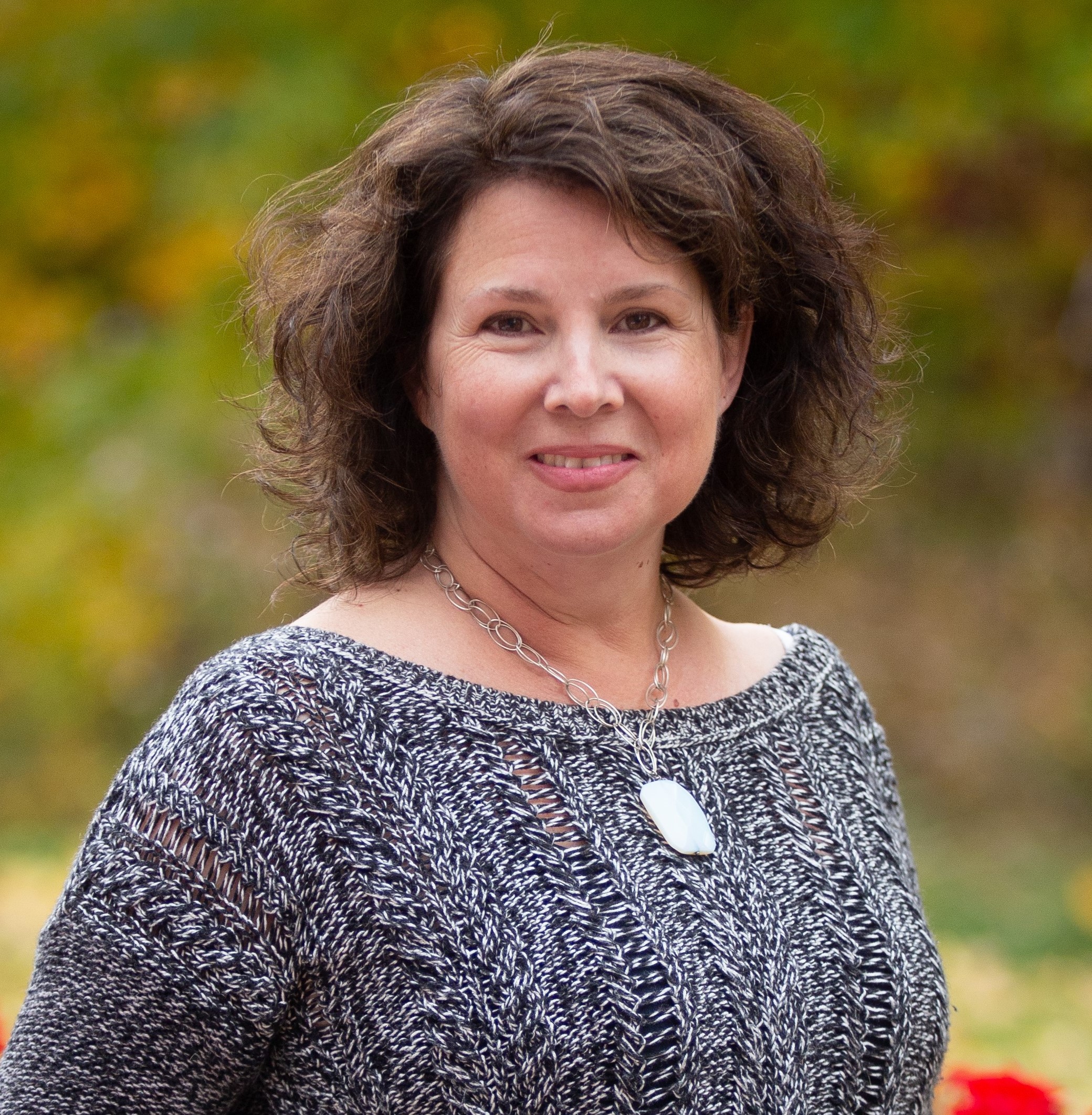
Lisa Stockton
University of Ottawa Institute of Mental Health Research

Shruti Patel
The University of Ottawa Institute of Mental Health Research at The Royal

Tammy Beaudoin
The University of Ottawa Institute of Mental Health Research

Jennifer Boyko

Cory Taylor
Andrew Wakefield
Imperial 1-6
45 Min Breakout / Séance de 45 minutes en petits groups
In recent years with the advent of Canada’s Strategy for Patient-Oriented Research and other community engagement strategies, there is an imperative for research to be guided by those most impacted by the research. Engaging persons with lived and living experience (PWLLE) in research is becoming more common – and often required by funding agencies. This session will bring together multiple perspectives (i.e., academic health sciences centre, university, funder, PWLLE) of how research administrators can support researchers engage with PWLLE throughout the research process including the development of research priorities, funding applications, grant review processes, project implementation, and knowledge mobilization. The panel presentation will include case studies of supporting inclusion of PWLLE in different aspects of research, sharing critical success factors, challenges, tools/resources and lessons learned, while also facilitating an interactive exchange to seek insights and experiences from the audience. In alignment with CARA’s strategic priorities, this session will engage the audience as co-learners, and provide a forum to share and build our collective knowledge of actions we can take to support meaningful inclusion PWLLE in research, thereby increasing the relevance and use of research and its ultimate impact.
 May 15, 2024 10:30 am
May 15, 2024 10:30 am Dominique Michaud
Rachel Brown
Imperial 1-6